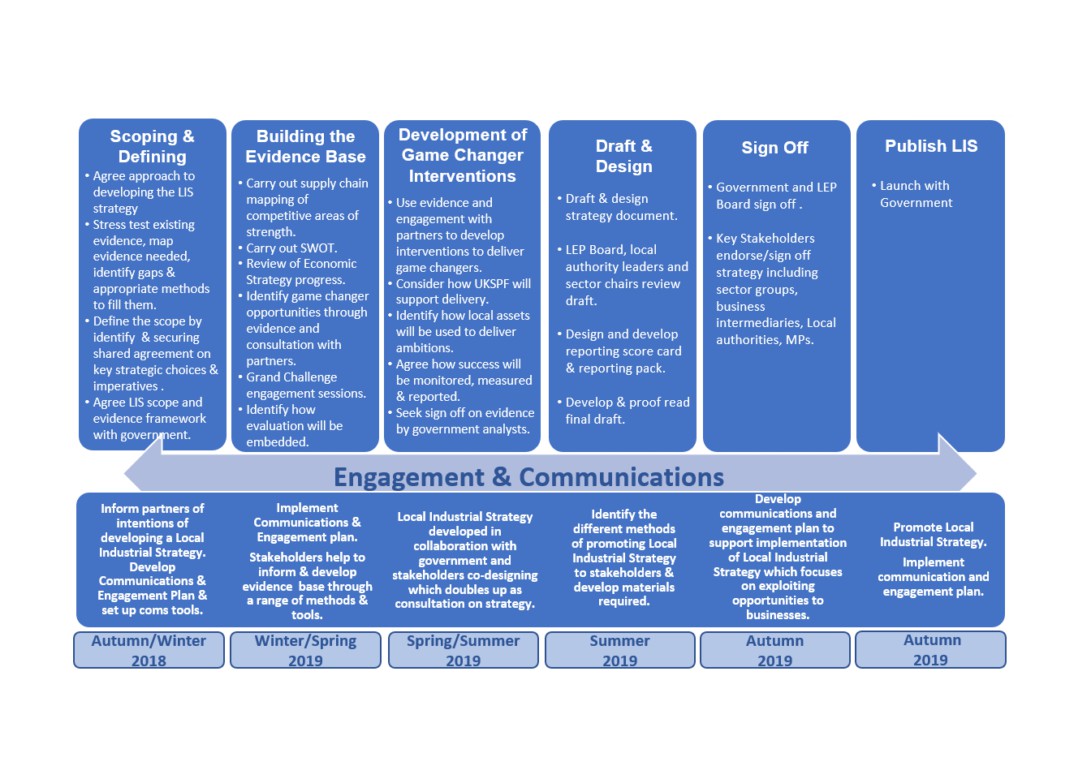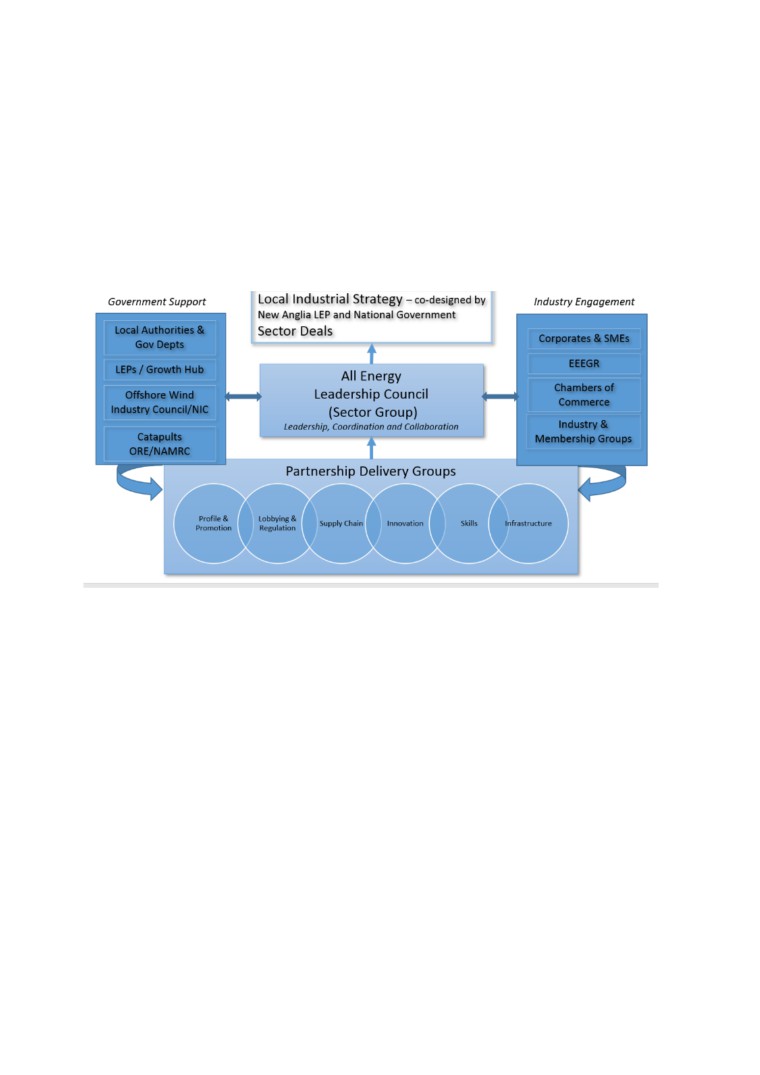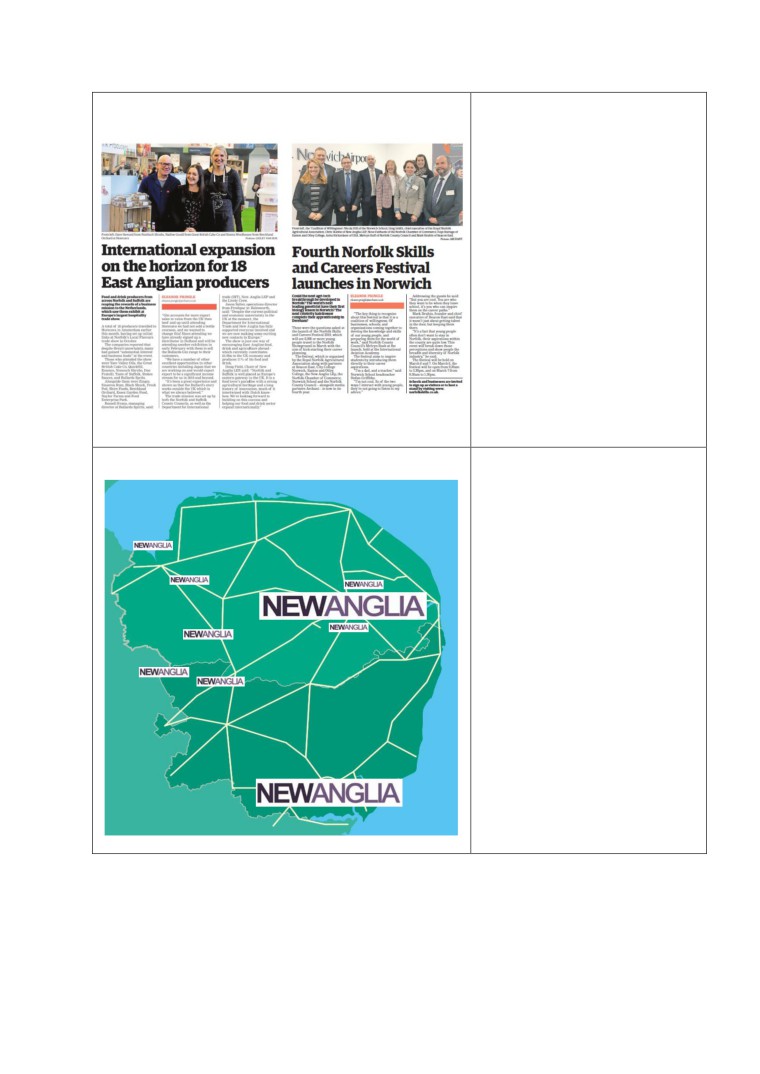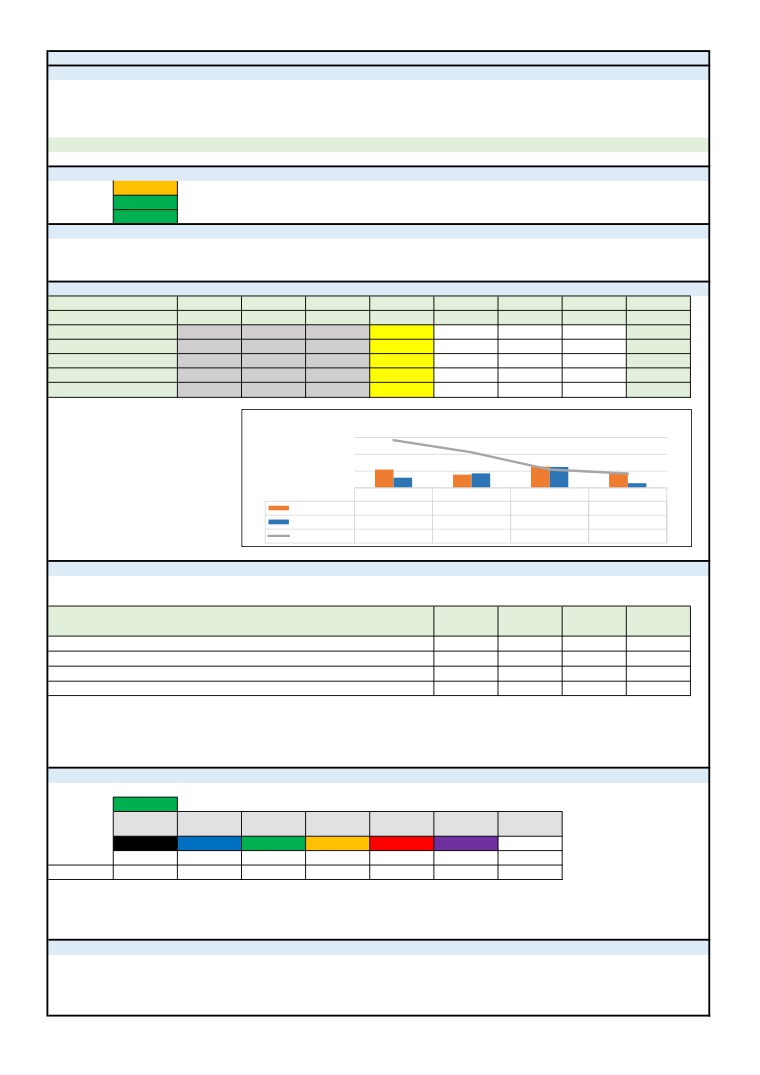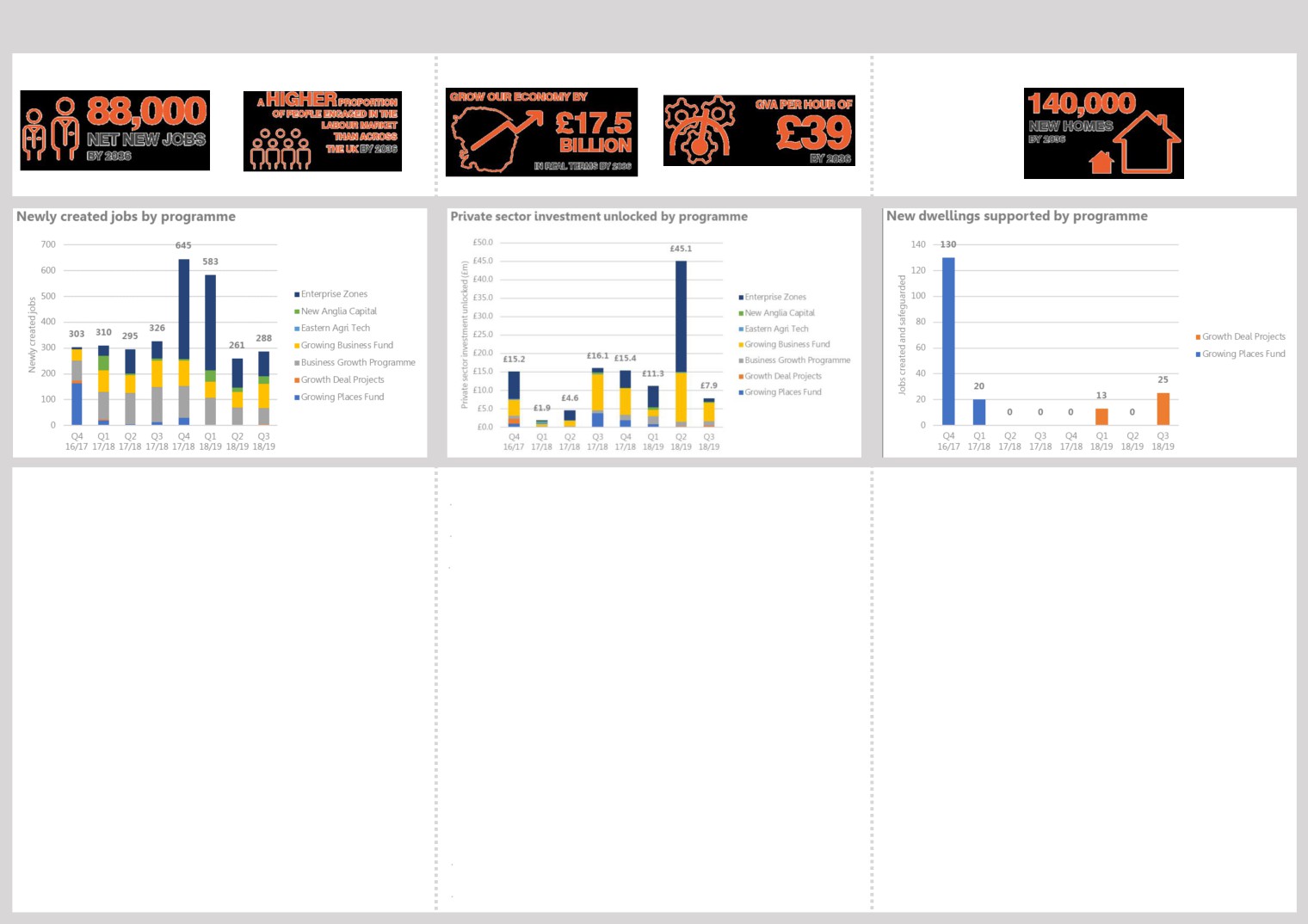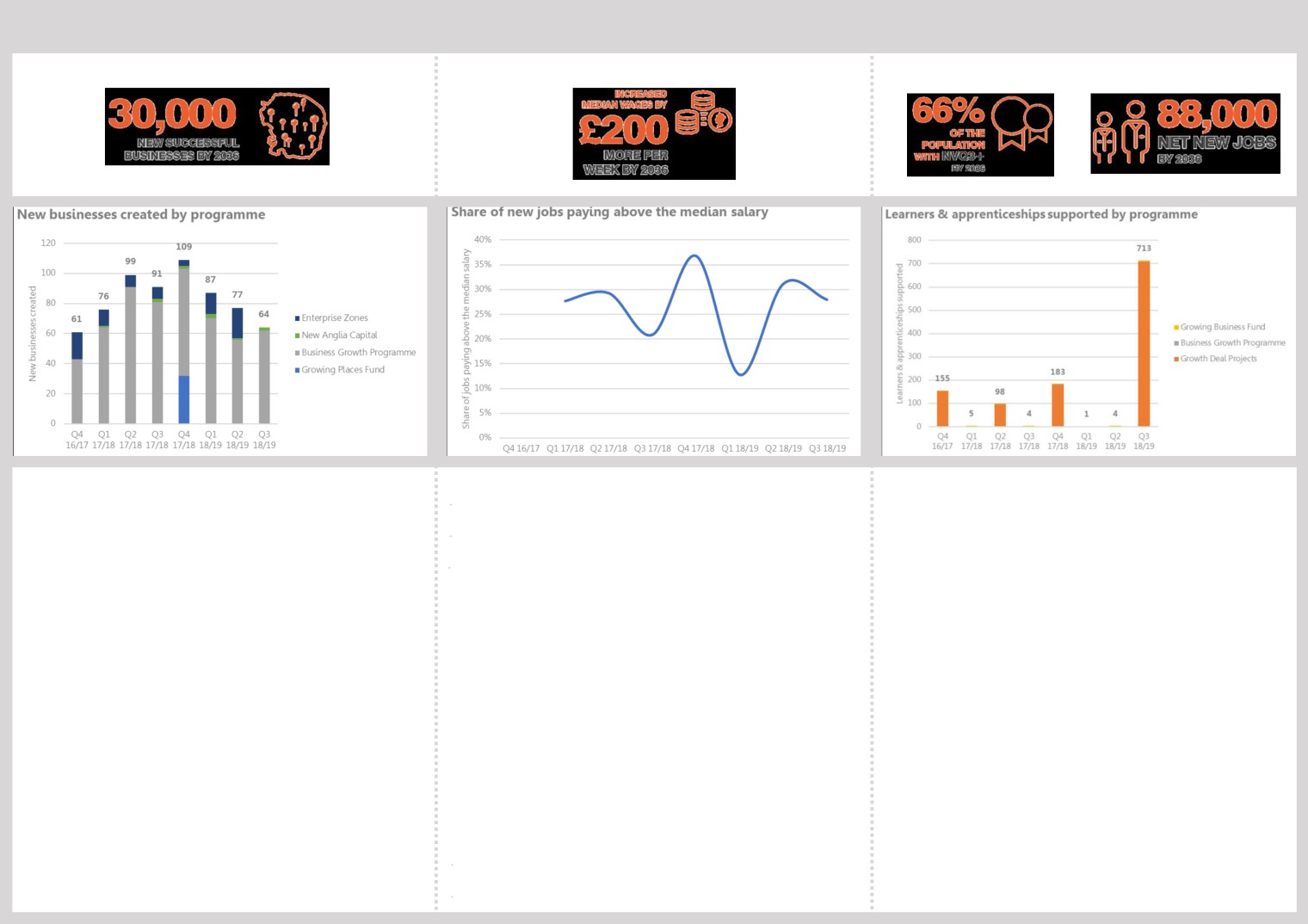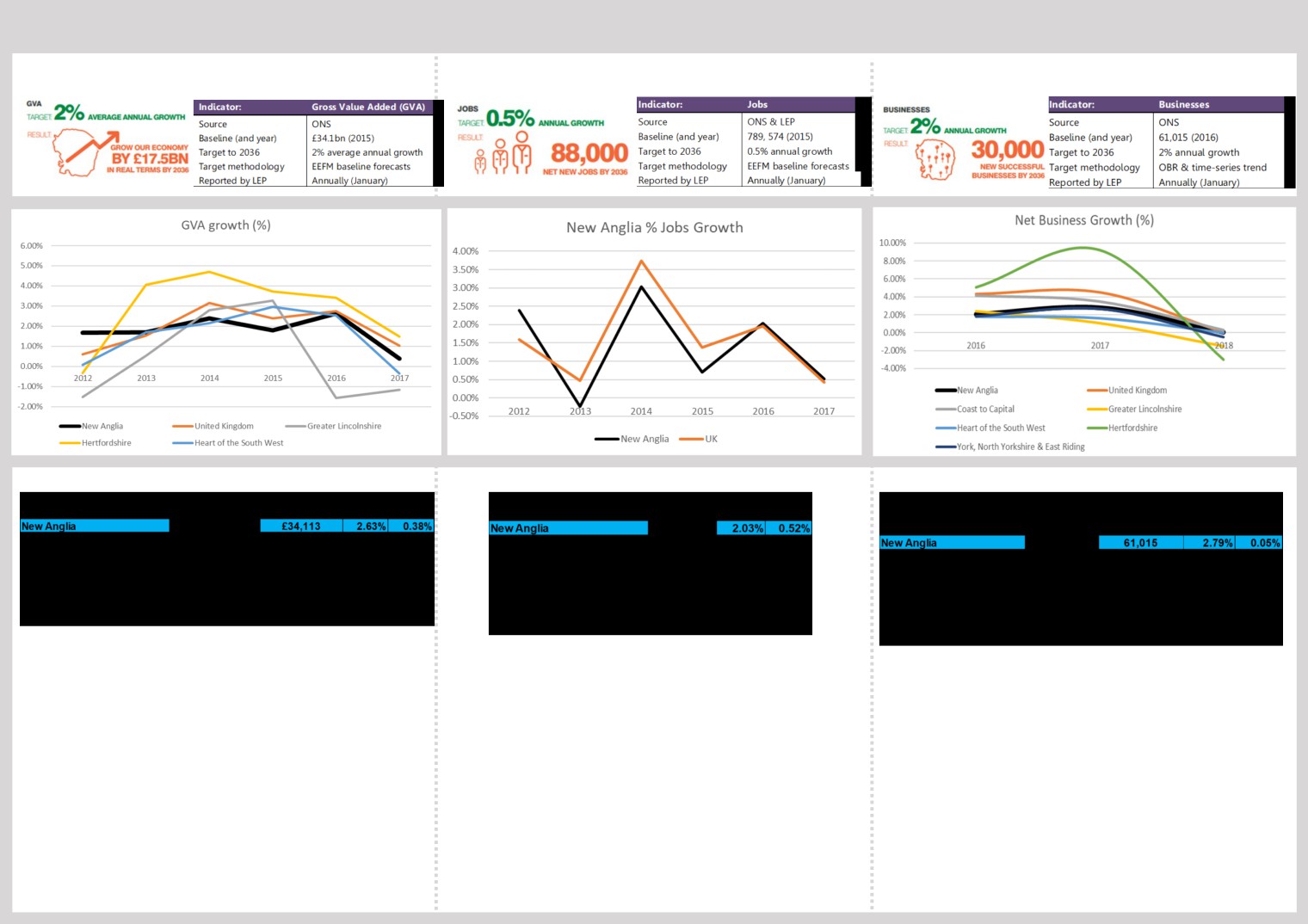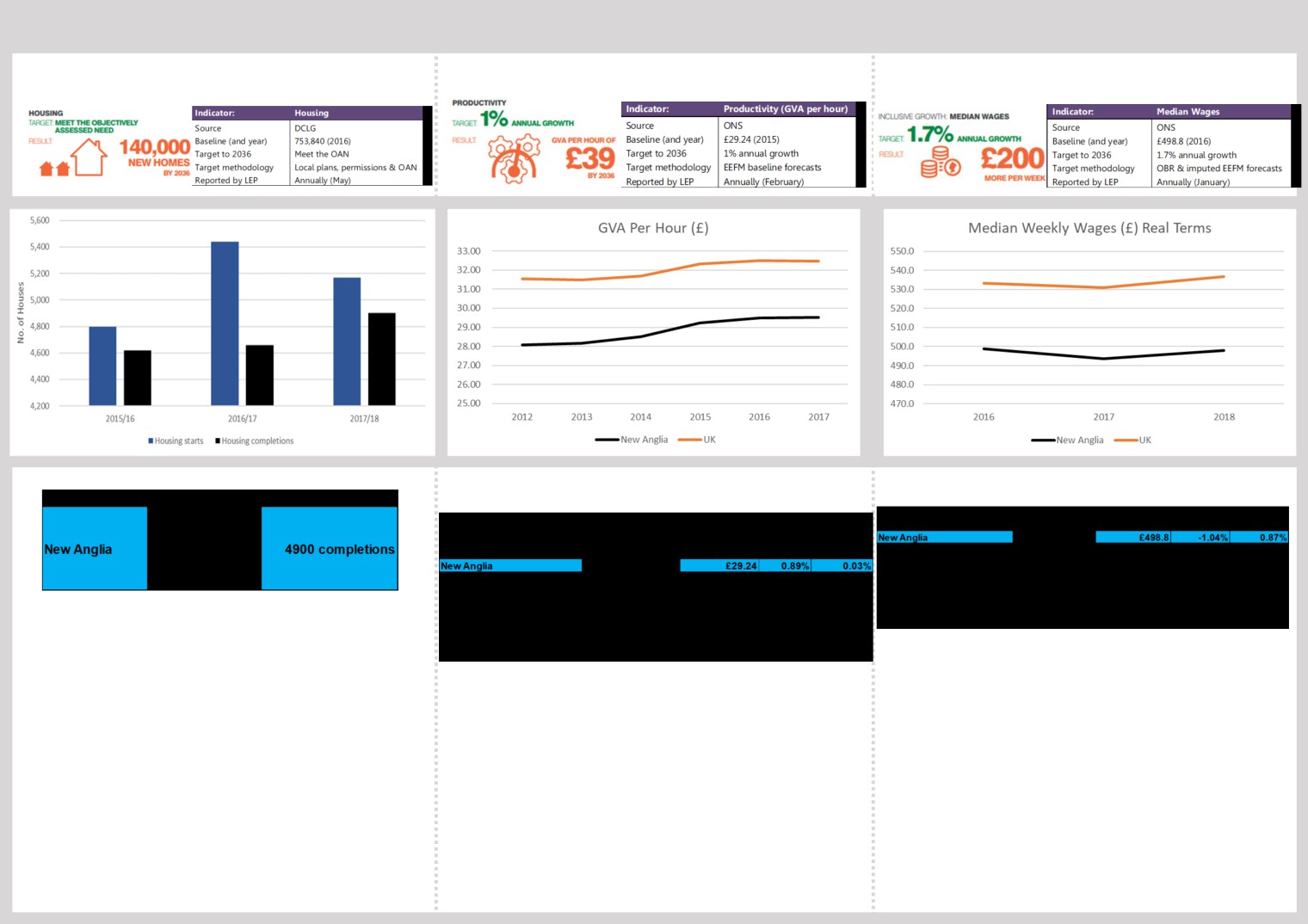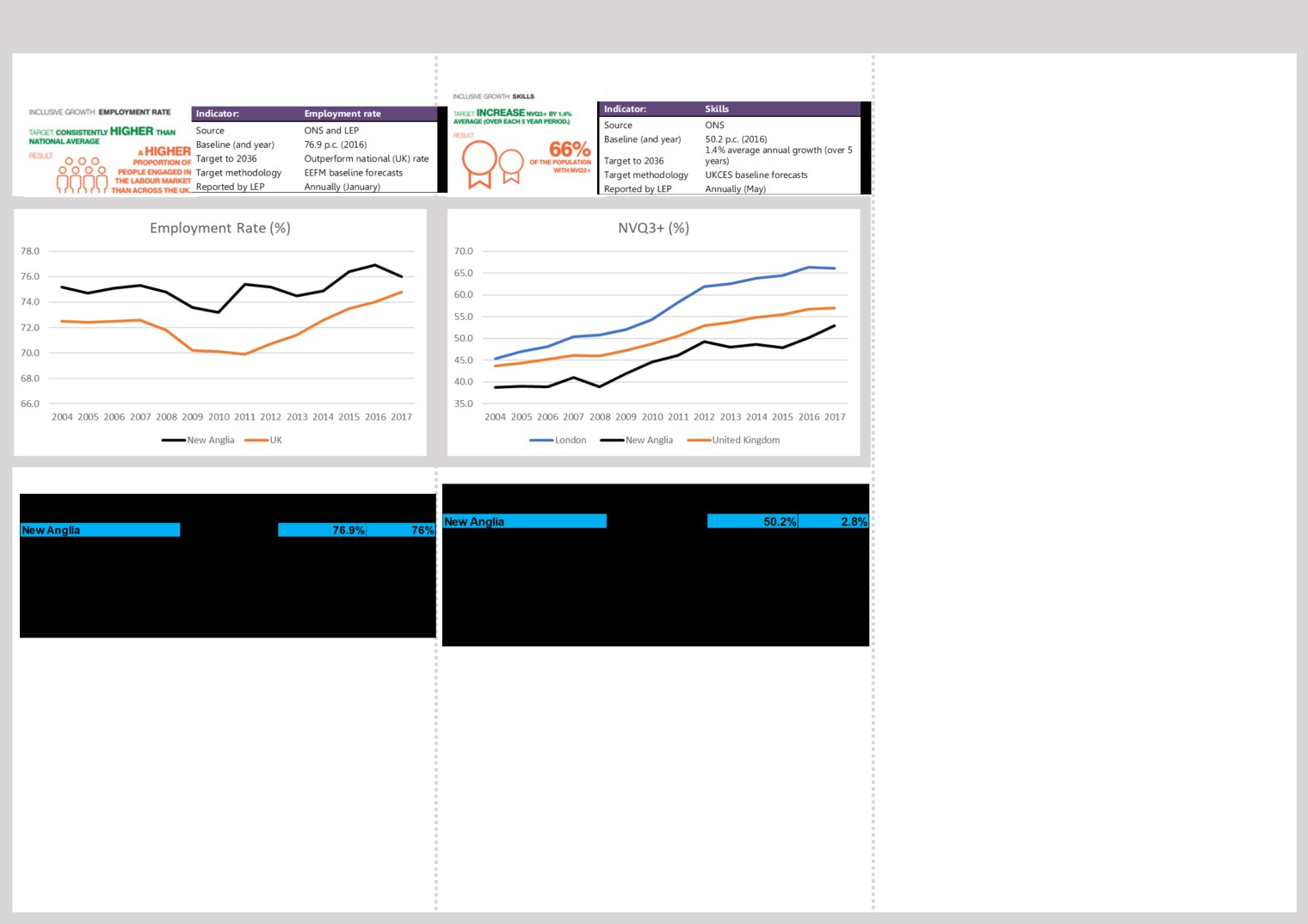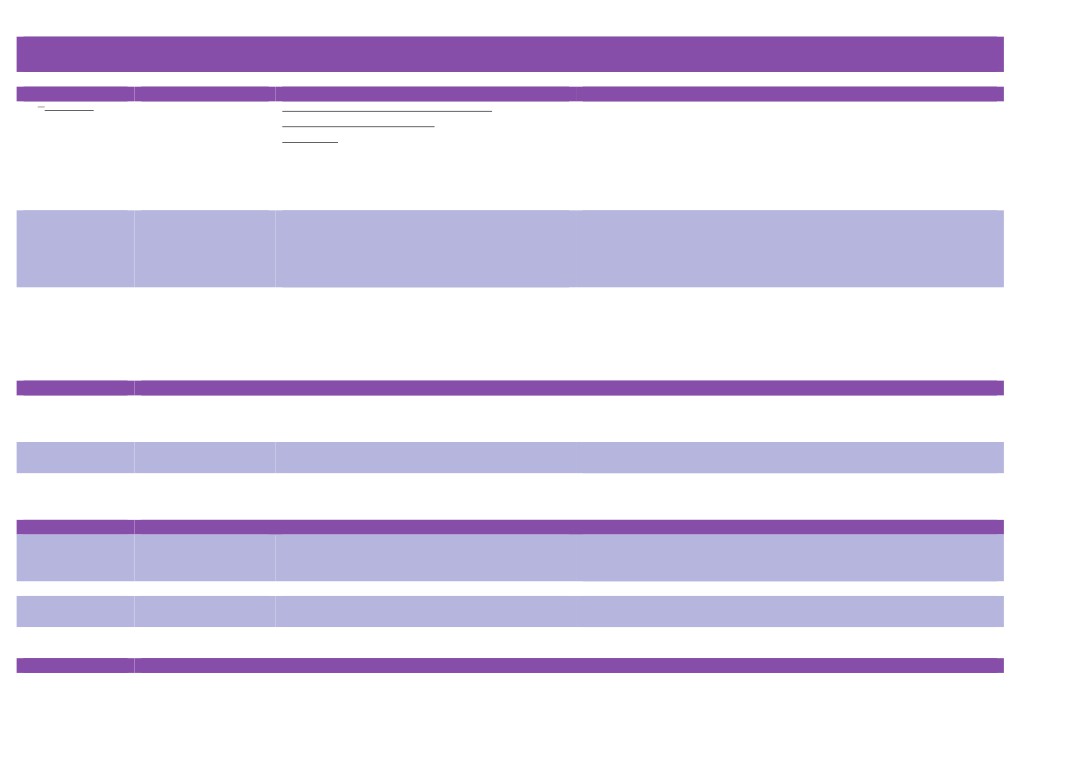New Anglia Local Enterprise Partnership Board Meeting
Wednesday 27th February 2019
10.00am to 12.30pm
The Ideas Factory, Cavendish House,
St Andrews Street, Norwich NR2 4AEV
Agenda
No.
Item
Duration
20 mins
1.
Welcome from the Chair
2.
Apologies
3
Welcome from Norwich University of the Arts
4.
Declarations of Interest
5
Actions / Minutes from the last meeting
Forward Looking
60 mins
6.
Place Branding - Phase 1: Brand Narrative, Values and Visual Identity
Presentation
7
Place Branding - Phase 1 & 2: Branding, Delivery and Timeline
For Approval
8.
Local Industrial Strategy
For Approval
9.
Norfolk and Suffolk All Energy Industry Council
For Approval
Break
10 mins
10.
Brexit
Update
Governance and Delivery
60 mins
11.
Private Sector Board Appointments
For Approval
12.
Chief Executive’s Report
Update
13.
February Programme Performance Reports Including Dashboards
Update
14.
Finance Report including Confidential Appendices
Update
15.
Board Forward Plan
Update
16.
Any Other Business
Next Meeting: 10.00am - 12.30pm, 27th March 2019
Venue: Birketts Solicitors, Providence House, 141-145 Princes St, Ipswich IP1 1QJ
1
New Anglia Board Meeting Minutes (Unconfirmed)
30th January 2019
Present:
David Ellesmere (DE)
Ipswich Borough Council
Doug Field (DF)
East of England Coop
Dominic Keen (DK)
High Growth Robotics
Steve Oliver (SO)
MLM Group
Andrew Proctor (AP)
Norfolk County Council
Johnathan Reynolds (JR)
Nautilus
Sandy Ruddock (SR)
Scarlett & Mustard
Nikos Savvas (NS)
West Suffolk College
Alan Waters (AW)
Norwich City Council
Jeanette Wheeler (JW)
Birketts
Tim Whitley (TW)
BT
Attendees
Helen Langton (HL)
University of Suffolk (For David Richardson)
Shan Lloyd (SL)
BEIS
Sue Roper (SuR)
Suffolk County Council
Chris Dashper (CD)
New Anglia LEP
Julian Munson (JM)
New Anglia LEP
Chris Starkie (CS)
New Anglia LEP
Rosanne Wijnberg (RW)
New Anglia LEP
Helen Wilton (HW)
New Anglia LEP
1
3
Actions from the meeting: (30.1.19)
Minutes of the last meeting 23rd November 2018
To provide an update on the Ports and Logistics Group
EG
Aims and Objectives for the Year
Arrange a presentation from the Growth Hub on the support being provided to business
CS
Brexit
To ensure that Brexit intelligence is distributed to all MPs
CS
LEP Board Diversity Champion
To submit comments on the LEP’s Diversity Policy to DE
ALL
Amendments to Committee Terms of Reference
To obtain authorisation in writing from Mark Jeffries that the Board has the legal authority to
CS
amend the Articles of Association
To agree a suitable date for attendance with the Section 151 Officer
RW
To consider the voting rights of deputies at sub-committees
RW
Finance Report
To submit a proposal on consolidating reporting
RW
1
Welcome from the Chair
Doug Field (DF) welcomed everyone to the meeting including Helen Langton (HL) who was
deputising for David Richardson. DF thanked HL for hosting the board meeting.
2
Apologies
Apologies were received from William Nunn, Matthew Hicks, David Richardson, John Griffiths and
Lindsey Rix
3
Welcome from the University of Suffolk Vice-Chancellor
HL welcomed all board members to the meeting and provided an overview of the progress the
University has made over recent months including becoming a full university with degree powers.
She advised that the future focus will be on recruitment and ensuring the university can offer areas
of distinctiveness to attract students in an era of high competition between universities.
4
Declarations of Interest
Full declarations of interest can be found at http://www.newanglia.co.uk/about-us/the-board.
DF declared an interest in the investments in Novafarina and Supapass as detailed in the New
Anglia Capital report.
5
Minutes of the last meeting 23rd November 2018
The minutes were accepted as a true record of the meeting held on 23rd November 2018.
Matters arising & actions
For the LEP team to ensure that links are progressed with other sub-national transport
bodies
CS advised that a meeting had been held with England’s Economic Heartland to identify
areas of collaboration.
Jeanette Wheeler (JW) requested an update on the Network Ports and Logistic Group.
EG
To receive a paper on CO2 reductions for consideration of inclusion in the economic
strategy targets
Johnathan Reynolds (JR) advised that a proposal from the UEA to develop a Scoping
Report on the Climate Change Adaptation and Carbon Reduction Strategy for New Anglia
had been submitted for comment.
6
Aims and Objectives for the Year
Chris Starkie (CS) provided the Board with an overview of the LEP’s priorities for 2019
focussing on the current challenges to delivery and the priority themes for the coming year.
CS also highlighted how the LEP has delivered against its objectives to date identifying key
projects and the positive effect their realisation has had on Norfolk and Suffolk.
2
4
CS reviewed the progress being made against targets confirming that progress was being
made in all areas but noted that the LEP was not the only influence on these targets and
that some factors were outside of the LEP’s control.
The presentation also covered the wider economic and political context within which the
LEP is operating and the challenges that it faces at the current time.
CS stressed that the Government has reconfirmed its support for LEPs both in the
development of the Local Industrial Strategies and the Shared Prosperity Fund.
CS advised that, given the current challenges, the Executive team had examined the
Economic Strategy and firmly believed that it remained pertinent and the priorities it
established remained unchanged.
CS advised that the aims and objectives fell into four key areas:
1. Deliver the Economic Strategy - including the Local Industrial Strategy which will
be key to obtaining Government backing for gamechanging projects
2. Promote our Place - progressing the place branding work and making the most of
opportunities to promote Norfolk & Suffolk. The LEP will also develop and
implement a new inward investment strategy to maximise inward investment and
trade
3. Strengthen our Governance - complete implementation of the LEP review, and a
review the LEP’s operating structure to ensure it delivers outstanding results and
value for money
4. Drive Local Growth - The LEP will set, monitor and achieve stretching targets in all
its funded and delivered programmes and will support local businesses and exploit
opportunities as they are identified
CS reiterated that the fundamental approach of the Economic Strategy is still right namely
improving productivity and promoting inclusive growth.
CS presented an overview of what would success look like in 12 months time covering 5 key
areas:
1. Signing off an ambitious Local Industrial Strategy with Government
2. Launching and starting to see the benefits from the place branding exercise.
3. Maintaining the LEP’s strong reputation with Government for governance and
delivery
4. Securing the confidence of the board in the work of the LEP
5. Realising strong progress on the delivery of the Economic Strategy despite
economic and political challenges.
DF thanked CS for the presentation and asked for questions.
The meeting discussed the key role the LEP could play in providing strong leadership during
the current period of uncertainty.
David Ellesmere (DE) asked about how New Anglia performed against other LEPS. CS
agreed that this would be useful and would investigate what data was available on similar
LEPS.
Jennette Wheeler (JW) asked if the LEP had the sufficient resource and capacity required to
deliver against all the areas of work in which it is involved. Rosanne Wijnberg (RW)
confirmed that a planning exercise was ongoing to confirm resource against the projects and
that the findings would be brought back to the Board but that both she and CS felt that
resourcing was correct.
JW asked whether the Growth Hub had the sufficient knowledge and resource to support
businesses at this critical time
DF asked if the Growth Hub could present at the Board to present their approach to
business support.
3
5
The Board discussed the importance of productivity and how the LEP can contribute to
improvements in this area.
The Board agreed:
To note the content of the presentation
To agree with the approach and the continued focus on the delivery of the Economic
Strategy
To receive performance data on LEPs similar to New Anglia
CS
To receive a presentation from the Growth Hub
7
Place Branding
Steve Oliver (SO) provided the board with a verbal report on the work carried out to date
with Jacob Bailey on developing the place branding strategy to deliver an umbrella brand.
The Board was advised that research had been carried out from September which included
engagement with over 100 stakeholders and has been followed by detailed discussion
resulting in the brand narrative.
SO confirmed that local authority leaders had been involved in the process and advised that
CMS and Jacob Bailey will be presenting at the February Board to present the brand.
The Board agreed:
To note the content of the report
8
Brexit
CS presented the board paper for this standing item.
CS noted that the key area for the LEP was providing support to businesses and the LEP
would look at existing support funds to ascertain if any could be amended to provide more
assistance to companies.
DE asked if MPs were receiving the intelligence provided by LEPs and councils.
CS confirmed that sessions had been held with some MPs but an action would be taken to
ensure this was provided to all.
The Board agreed:
To note the content of the report
To ensure that Brexit intelligence is distributed to all MPs
CS
9
New Anglia LEP Diversity Champion
CS presented the report and advised the board that the appointment of a diversity champion
was recommended as best practice in the LEP review.
CS advised that DE had been approached and agreed to take up the role subject to
ratification to the Board.
DE stated that he would review the LEP’s current diversity policy and asked for feedback
from the board before he reported back in March.
JW noted that there should be clarification on what is internal and external policy and will
provide comments to DE.
SO asked what success the success criteria would be. DE advised that success would be
about more than board gender diversity but also about other areas such as those
businesses receiving funds and LEP staffing.
The Board agreed:
To endorse the appointment of DE as Diversity Champion
To submit comments on the LEP’s Diversity Policy to DE
ALL
10
Election of Deputy Chair
DF presented the paper proposing the appointment of Lindsey Rix (LR) as the Deputy Chair.
It was passed by the Board and agreed that her term as Deputy Chair and as a Board
member will tie in together.
The Board agreed:
To appoint Lindsey Rix as Deputy Chair of the Board
4
6
11
Amendments to Committee Terms of Reference
RW presented the paper formalising the changes to governance agreed at the October
board meeting and updating other relevant documents. These are divided into 4 key areas:
Amendments to Articles of Association - These have been updated to reflect the changes to
the LEP Board membership and the quorum has been amended as a result of these
changes.
JW queried whether the Articles of Association need to be amended by Special Resolution
at a General Meeting rather than the Board. CS advised that he had received advice that
the Board could confirm the changes.
The Board agreed to confirm the changes subject to confirmation in writing that they had the
authority to do so without a general meeting.
ACTION: CS to ensure obtain authorisation in writing that the Board has the legal authority
CS
to amend the Articles of Association.
LEP Board Attendance and Deputisation Policy - RW reviewed the changes to the policy and
requested Board approval for the amendments.
Nikos Savvas (NS) queried whether deputies had voting rights. RW confirmed that they do
have the right to vote and would update the policy for clarity.
The Board agreed to the proposed changes.
Investment Appraisal Committee (IAC) - RW advised that, at the request of the chair of the
IAC, it is proposed to expand the membership by one additional private sector member,
independent of the LEP Board, to strengthen the expertise of the committee.
Andrew Proctor (AP) raised the importance of having county representation on the IAC.
This would mean that one of the three local authority representatives would be a county
representative.
The Board agreed to both proposed changes.
Audit and Risk Committee - RW asked the Board to approve an amendment to the Terms of
Reference to allow the S151 Officer to delegate authority for attendance at this committee to
a suitable representative.
The Board agreed to the proposed change.
It was noted that it had been raised at the LEP Review that the Section 151 Officer should
attend the LEP Board once a year.
ACTION: To agree a suitable date for attendance with the Section 151 Officer.
RW
NS queried whether deputies on sub-committees have voting rights.
RW advised that this will be considered further and brought back to the Board.
ACTION: To consider the voting rights of deputies at sub-committees
RW
New Anglia Capital (NAC) - DF advised that Kevin Horne had left the Board and asked for
suggestions for nominations to be submitted to Chris Dashper (CD).
Dominic Keen expressed his interest in joining the NAC Board.
The board agreed to nominate Dominic Keen to the NAC board.
The Board agreed:
To note the content of the report
To agree the proposed changes to the Articles of Association subject to confirmation
in writing that they had the authority to do so.
To agree to the two proposed changes to the IAC Terms of Reference.
To agree to the proposed change to the Audit and Risk Committee Terms of
Reference.
To receive clarification on the voting rights of deputies at LEP sub-committees.
To nominate Dominic Keen to the NAC Board
5
7
12
Chief Executive’s Report
CS presented his report to the Board and asked for questions.
CS advised that there had been significant interest in the recent project calls and noted that
discussions have been held with local authorities regarding the possibility of expanding the
Innovative Projects Fund.
Enterprise Adviser Network (EAN) - CS advised that the TUPE transfer had been completed
however one of the team members is seriously ill in hospital. The LEP team are providing
pastoral care for his family and the EAN team. DF asked for the best wishes of the Board to
be passed on.
Offshore Wind Sector - CS provided an update on work to promote the offshore sector
including the production of a prospectus detailing the collective approach to the Offshore
Winder Sector Deal which was being presented to Clare Perry, the Energy Minister.
Johnathan Reynolds (JR) endorsed the prospectus and noted that on-shore energy also
needed the same focus.
JW asked for further information on the economic shocks detailed in the report.
CS advised that Heatrae Sadia was consolidating at a larger plant in the Midlands and the
decision to close was a management one due to spare capacity at the other plant.
The Board was advised that Phillips Avent was also consolidating its operating sites.
The LEP was working with the management team to offer support to staff.
Agritech - CS advised that discussions with the Combined Authority have been ongoing but
there is still no definitive date on when ministers will make a decision on the release of
funding.
The board was recommended to set a deadline of March 31st for continued participation in the
Eastern Agri Tech programme. If funds are not released by March 31st by Government, the
£1m allocated should be deallocated and a fresh proposal for its use brought to the board.
This was agreed by the Board.
Board Recruitment - The Board was advised that 15 applications have been received.
CS & RW have carried out an initial review and will make recommendations as to which
candidates to interview. The recommendations for board appointments will made at the
February board meeting.
NWES - CS updated the meeting on recent news reports concerning NWES and confirmed
that the LEP had carried out due diligence on the loan for the KLIC and that the loan had
been repaid on time.
A sale has been agreed on Rouen House where the LEP had agreed not to implement the
clawback clause on its grant subject to the building continuing with the same use as an
enterprise centre.
The Board agreed:
To note the content of the report
To set a deadline of March 31st for continued participation in the Eastern Agritech
programme. If funds are not released by March 31st by Government, the £1m allocated
will be deallocated and a fresh proposal for its use brought to the board.
13
January Programme Performance Reports
RW reviewed the performance reports and updated the meeting as on the following:
Business Growth Programme - The programme was now rated green as funding had been
secured and targets restructured.
NWES delivery is rated as red due to the delays to delivery. NWES is producing a plan to
address the delays and an additional partner has been engaged to help deliver programmes
to start ups to fill the shortfall.
6
8
Enterprise Zones - these are long term projects. Job numbers realised are lagging behind
target and this will be monitored. Julian Munson (JM) noted that there is often a lag
between realising floor space and achieving the relevant job numbers.
The Board agreed:
To note the content of the reports
14
Finance Report
RW reviewed the finance report and clarified how finances were reported as requested at
the last Board meeting.
RW suggested bringing back a proposal on consolidating reported to the March board
meeting.
Core Finances - RW reviewed the reports noting key variances.
The Board agreed:
To note the content of the report
To receive a proposal on consolidating reporting
RW
15
Board Forward Plan
CS reviewed the Forward Plan and asked for suggestions for agenda items from the Board.
The Board agreed:
To note the content of the plan
16
Any Other Business
None
The Board held a private session to discuss Item 17
17
Remuneration Committee Update - Confidential
DF provided an update on discussions held at the last committee meeting in December and
asked Board members for their comments.
The findings of the Remuneration Committee were endorsed by the Board.
Next meeting:
Date and time of next meeting:
10.00am - 12.30pm, 27th February 2019
Venue: The Ideas Factory, Cavendish House, St Andrews St, Norwich NR2 4AEV
7
9
Actions from New Anglia LEP Board Meetings
Date
Item
Action
Update
Actioned
Status
By
30/01/2019
Minutes of the last meeting
To provide an update on the Ports and Logistics Group
Included in the February Chief Executive's Report
EG
Complete
23/11/2018
30/01/2019
Aims and Objectives for the
Arrange a presentation from the Growth Hub on the support being
Added to the Board forward plan
CS
On-Going
Year
provided to business
30/01/2019
Brexit
To ensure that Brexit intelligence is distributed to all MPs
The weekly Brexit intelligence report is now being
CS
Complete
distibuted to all MPs in the New Anglia area
30/01/2019
LEP Board Diversiry
To submit comments on the LEP’s Diversity Policy to David Ellesmere
ALL
On-Going
Champion
30/01/2019
Amendments to Terms of
To obtain authorisation in writing that the Board has the legal authority
We have engaged Sam Sutton, Mills&Reeve to review the
CS
On-Going
Reference
to amend the Articles of Association
amendments to the Articles of Association and support
formal adoption of these changes.
30/01/2019
Amendments to Terms of
To agree a suitable date for attendance with the Section 151 Officer
It has been agreed that the Section 151 Office will attend
RW
Complete
Reference
the September Board meeitng
30/01/2019
Amendments to Terms of
To consider the voting rights of deputies at sub-committees
It is recommended that deputies are NOT permitted at the
RW
Complete
Reference
sub-committee level.
23/11/2018
Infrastructure
For the LEP team to ensure that links are progressed with other sub-
Ongoing
EG
On-Going
national transport bodies
23/11/2018
Finance Report
To receive further detail on the receipt of loan repayments and interest
After discussion with Lindsey Rix further consideration will
RW
On-Going
receipts
be given to providing a briefing session to Board members
on 2019/20 funding.
21/02/2018
Economic Indicator
To receive a paper on CO2 reductions for
Work is ongoing in conjunction with the UEA
CS/JR
On-Going
Trajectories and Targets:
consideration of inclusion in the economic strategy targets
11
New Anglia Local Enterprise Partnership
Board Decision Log - Public
Date
Decision
Decision Made
Making Body*
30/01/2019
LEP Board
The Board Made the following decisions:
Aims and Objectives
To agree with the approach and the continued focus on the delivery of the Economic Strategy
New Anglia LEP Diversity Champion
To endorse the appointment of David Ellesmere as Diversity Champion
Election of Deputy Chair
To appoint Lindsey Rix as Deputy Chair of the Board
Amendments to Committee Terms of Reference
To agree the proposed changes to the Articles of Association subject to confirmation in writing that they had the authority to do so.
To agree to the two proposed changes to the IAC Terms of Reference.
To agree to the proposed change to the Audit and Risk Committee Terms of Reference.
To nominate Dominic Keen to the NAC Board
Chief Executive’s Report
To set a deadline of March 31st for continued participation in the Eastern Agritech programme. If funds are not released by March 31st by
Government, the £1m allocated will be deallocated and a fresh proposal for its use brought to the board.
30/01/2019
Investment
The IAC made the following decisions:
Appraisal
VCSE Challenge Fund
Committee
To commit £500k grant funding from the Growing Places Fund for the VCSE Challenge Fund, allowing a challenge fund of £250k per year.
That two LEP Board members should to sit on the VCSE appraisal panel
05/12/2018
Growing
The Panel approved the following applications:
Business Fund
• Spectra Packaging Limited - Agreed to support
Panel
Approved Grant: £74,486 under De Minimis
• Stephen Walters & Sons Limited - Agreed to support
Approved Grant: £118,049 under De Minimis
21/11/2018
LEP Board
The Board Made the following decisions:
Tier 2 Review
To accept the recommendations as detailed above.
To receive a future paper from both the Innovation Board and the International and Inward Investment Sub-Group following the review their
own TORs
To require LEP sector groups to develop common Terms of Reference focusing on the leadership and promotion of the sector
That sector groups need their own governance distinct from membership bodies
To receive regular reports from all Sector groups
LEP Board Governance
To adopt the process for the appointment of the deputy chair
Enterprise Zone Accelerator Project - Confidential
November Programme Performance Reports
To receive clarification on the Dashboard outputs and RAG status. Once received approve the submission of the Government Dashboard
* New Anglia Local Enterprise Partnership Board, Investment Appraisal Committee, Growing Business Fund Panel, Remuneration Committee, Audit & Risk Committee
New Anglia Local Enterprise Partnership Board
Wednesday 27th February 2019
Agenda Item 7
Place Branding - Phase 1 & 2: Branding, delivery and timeline
Authors: Lesley van Dijk and Julian Munson
Summary
This paper updates on progress on the development of a single overarching place brand
(umbrella brand) for Norfolk and Suffolk and supports a presentation to the LEP Board outlining
the process and research undertaken over the past six months resulting in the final proposed
brand narrative, values and identity. This paper also outlines the proposed key stages of
communication, engagement and implementation of the brand.
Recommendation
The Board is asked to approve the umbrella brand
The Board is also asked to approve the timeline, communication and implementation
plan as outlined in this report.
Background
The Economic Strategy for Norfolk and Suffolk emphasises the need for consistent place
branding and an overarching international offer in order to accelerate the economic growth of
our two counties.
Recent stakeholder lunches with businesses as well as events organised by both chambers of
commerce have continued to highlight the lack of a strong brand identity holding back the
potential of our businesses.
It was agreed by the LEP Board and key stakeholders that further brand development work was
required to develop strong and cohesive messages, values and a visual identity which brings
together our world-class inward investment and business location offer.
It is to coordinate and amplify our Offer to the World, and not to replace any existing campaigns
or brands.
It was agreed that this brand will enhance our inward investment activity and will help attract
skilled people to work or study in the area.
As outlined in the paper presented to the LEP board on 20 June 2018, the Board approved the
first stage of brand development and agreed a timeline of activity including presenting back to
the Board in February 2019.
1
13
Following a competitive tender process, agencies CMS and Jacob Bailey were commissioned
to progress the first stage of brand development, overseen and managed by a Steering Group
comprising members of the LEP Board and Executive Team, as agreed.
The brief: ‘Develop an umbrella brand that brings together our world-class inward investment
and business location offer. To stand out from other areas of the UK and the global economy.’
CMS and Jacob Bailey have applied a thorough and robust method to develop the place
branding, including the ‘5i approach’ (investigate, insight, inspire, implement and interrogate).
During the research stage more than a hundred people from the public and private sectors
have been engaged (incl. telephone interviews with LEP Board members, sector leads and
partnership organisations; face to face interviews at MIPIM UK and online survey with industry
leads, businesses and local economic development officers). In addition to this, workshops with
stakeholders have taken place, and LEP/ Growth Hub teams and economic development
officers have been engaged in the brand development project.
Throughout the process the Department for International Trade has been involved in the
development of the branding and has endorsed the process.
The outcomes of the analyses, evidence and detailed responses have fully informed the brand
narrative, values and visual identity.
CMS and Jacob Bailey will present at the board meeting, giving board members the opportunity
to consider the work undertaken to date and inform its development.
Engagement and implementation plan
The presentation to board members is very much the first stage in the process.
For the brand and accompanying narrative to be adopted and used proactively promoting
Norfolk and Suffolk to the national and international business community, it is imperative to get
a wide range of stakeholders on board to become ambassadors for the brand.
Therefore, it is proposed to engage on a personal level with stakeholders and the media.
During this engagement period, a marketing and media campaign will need to be developed in
readiness to be launched publicly in July.
This will include the development of a new website and other appropriate collateral will be
commissioned and developed.
At a public event the narrative, values, identity and branded website aimed at investors,
businesses and professionals will be revealed.
The event will help promote and showcase our offer through success stories to a wider group,
including local businesses, Government officials and VIPs. A targeted national and international
roll-out will follow at key expos and through sector campaigns.
The communication, engagement and marketing activity is intended to support and advance
trade activity which is in line with the ERDF funded Invest East programme (see 20 June 2018
Board paper ‘Inward investment and international strategic framework’).
2
14
Timeline
Feb-May ‘19
July 2019
July ‘19 onwards
Engage
February - Presentation of narrative, visual identity and application at LEP Board meeting.
March to May 2019 - To ensure key stakeholders have the first opportunity to see the new
branding and narrative, the following engagement events are proposed:
-
Large engagement event early March in a central location with local authority officers
(economic development leads), business intermediaries, sector group chairs and
stakeholders who were involved during the brand development process
-
MPs event.
-
local and regional media briefings.
The team will also engage with other stakeholders through participating in meetings organised
by other partners.
Groups identified include the Norfolk leaders and chief executives group, the Suffolk Public
Sector Leaders Board, the Suffolk Growth Programme Board, Ipswich Vision, LEP sector group
meetings, Cambridge Norwich Tech Corridor as well as meetings of business intermediaries
such as the chambers of commerce the CBI and IoD. We will also want to engage with the New
Anglia Colleges Group, all three universities and the voluntary sector.
Launch
July 2019 - Public reveal of branding and website promoting the area’s offer at a special
location in Norfolk or Suffolk eg Adastral park, Norwich Research Park.
The event will launch the new branding officially to approx. 500 guests, including LEP Board,
local businesses, MPs, LA representatives, Government officials (DIT, BEIS, DoE, DfT and
Treasury), chambers of commerce, FSB, IOD, CBI and media.
Promote
July onwards - Local and national marketing and media campaign starts.
Oct 2019 - International launch at MIPIM UK in London and at All Energy Expo in Amsterdam,
the Netherlands.
Oct 2019 onwards - Sector launch campaigns, prospecting and conversion.
Recommendation
The Board is asked to approve the umbrella brand as presented.
The Board is also asked to approve the timeline, communication and implementation plan as
outlined in this report.
3
15
New Anglia Local Enterprise Partnership Board
Wednesday 27th February 2019
Agenda Item 8
Local Industrial Strategy (LIS) Update
Author: Lisa Roberts
Summary
This report provides an update on the development of the Norfolk and Suffolk Local Industrial
Strategy and seek budget approval from the Board to allocate some funds to support its
development. This Local Industrial Strategy will be a standing item for the LEP Board going
forward.
Recommendation
The Board is asked to note the contents of the report and to approve a budget of £55K to
secure external support to support the development of the Local Industrial Strategy.
Background
The Government has asked all parts of England to develop a Local Industrial Strategy, to show
how growth and productivity will continue to be achieved and to make the case for investment
once the current round of local growth funding and EU funding has ended.
For Norfolk and Suffolk, this does not mean revisiting all the ambitions and priorities set in the
Economic Strategy. We do not need “another strategy.” Rather it is a good opportunity to
assess how national and global economic trends are affecting our area and our businesses. To
take stock of progress in implementing our economic strategy, and to focus on the actions we
need to take to continue to support businesses to take the opportunities ahead as the post
Brexit economy evolves.
In September 2018 the LEP Board agreed the six stage approach to the development of the
LIS (see Appendix 1) and the Economic Strategy Delivery Coordinating Board (ESDCB) would
become the steering group for the development of the LIS.
Progress Update
Good progress has been made since September and work is nearing the end of the Scoping
and Defining stage. Please see appendix 2 which provides a snapshot of activity since
September and an overview of next steps.
1
17
Local Leaders Local Industrial Strategy Workshop 5th March Event
During the development of the Economic Strategy we held series of three workshops with the
LEP Board, LA Leaders, Education Leaders and Sector leads to oversee and guide the
development of the Norfolk and Suffolk Economic Strategy.
This was really important in order to give partners opportunities to feed in their priorities and
ideas into the development of the strategy - not the traditional approach of consulting on a
completed document.
As a consequence we developed a strategy that strongly reflected local strengths and
opportunities, which has been well received by Government and has the support of local
partners.
We are proposing that the work on developing the LIS is again overseen by local leaders, with
a series of three sessions during 2019. The first of these is on 5 March at Adastral Park
Ipswich.
The aim of this session is to:
1 Take stock of our collective progress against the Economic Strategy.
2 See how the national economy and situation has changed since we published it.
3 Agree how we use the LIS to drive implementation and set out our stall with Government for
further investment, particularly focussing on growing the areas where we have clear advantage
and opportunity, targeting support where it is going to have most impact.
The session will start with the Economic Strategy annual progress and will included an
overview of National and Global Trends - what has changed and changing; outline what a
Local Industrial Strategy is and how it relates to the Economic Strategy; and start to explore the
big opportunities that our LIS should take advantage of.
Sector Deals
Sector deals form an important part of the national Industrial Strategy.
It is therefore critical that our Local Industrial Strategy reflects sector deals as well as the
national Industrial Strategy.
Please see appendix
3 for more information on published Sector Deals and those in
development.
New Anglia LEP has been actively engaging with several sector deals which are relevant to the
Norfolk and Suffolk economy.
Offshore Wind Sector Deal - Ahead of the launch of the Offshore Wind Sector Deal, the
LEP has submitted an offshore wind prospectus to Government and the Offshore Wind
Industry Council mapping out our region’s cluster in terms of assets and vision. We are
liaising with Cabinet Office to ensure they promote our cluster on the day of the launch
and have enquired whether the deal could be launched in our region. Agenda Item 9
covers the Offshore Wind Industry Council which has been set up by the LEP in response
to our Local Industrial Strategy and sector deals.
Tourism Sector Deal - Following positive meetings with DCMS and Visit Britain in
January, the LEP Executive has kept discussions going on the Tourism Sector Deal as
we look to be recognised as a Tourism Zone in the deal. Visit East of England’s launch on
28th March at Holkham Hall provides the LEP with another good opportunity to showcase
our assets and vision given DCMS will be in attendance.
2
18
Nuclear Sector Deal - The business case for the nuclear supply chain programme has
been submitted to BEIS, where the LEP has worked closely with Heart of the South West
LEP, Cumbria LEP and Nuclear AMRC. The bid includes a national programme run by
Nuclear AMRC and regional programmes to be run by the LEPs. Given the strong links
between Hinkley Point C and Sizewell C, Heart of the South West LEP and New Anglia
LEP are working very closely together. We will keep the Board informed of developments
as the bid is considered by BEIS and the final decision has been made.
External Support and Budget Request
We have been continuing to utilise Metro Dynamics as our external consultants for the first part
of the development of the Local Industrial Strategy.
Metro Dynamics provided external support in the development of our Economic Strategy and
our contract with them gave us the opportunity to continue working with them for this stage.
They have been engaged to carry out an independent review of our evidence base, compare it
against the pilot LIS areas, identify gaps and produce a framework for the LIS evidence pack
which builds and enhances the Economic Strategy evidence base.
This support will conclude at the end of March 2019 and has been invaluable particularly in the
interim period while we recruit our new economic analyst.
The Economic Strategy Delivery Coordinating Board, which is chaired by the LEP chief
executive and includes representatives from key partners developing the LIS has agreed that
additional external support is required to support the next stages of the development of the
Local Industrial Strategy.
The support will bring additional skills and expertise that will complement the LEPs delivery
team supporting the development of the evidence and interventions for the LIS.
Government have provided LEPs with £200k to assist the development of the Local Industrial
strategy and to help build an evidence base that shapes interventions and has geographical
external validation.
The majority of that funding will be used to support in house resources - for example paying for
the LEP’s economic analyst and other team members now working full time on the LIS.
However we believe it is reasonable a proportion of the funding is used for external support.
The Board are asked to approve a budget of £55K to secure external support.
The funding is sufficient to secure the level of support required to take the development of the
LIS from the position it will be in at the start of April until publication in the autumn.
The request has come ahead of the LEP Budget as we will need to utilise March to undertake
the procurement process, including advertising the tender, so the support can be in place at the
start of April.
Link to the Economic Strategy and Local Industrial Strategy
Together with partners we have set out a clear vision, priorities and targets in the Norfolk and
Suffolk Economic Strategy - our blue print for inclusive growth and productivity. The Local
Industrial Strategy is the next stage in the evolution and implementation of our economic
strategy. It will build on the Economic Strategy by setting out in more detail the interventions we
will undertake to improved productivity and drive growth, with a particular focus on those market
opportunities where we have distinctive strengths and abilities - Clean Energy, Agri Food and
ICT.
3
19
Next Steps
See Appendix 2.
Recommendation
The Board are asked to approve a budget of £55K to secure external support to support the
development of the Local Industrial Strategy. here more information is required for board
members.
4
20
Appendix 1 - Approach to developing the Norfolk and Suffolk Local Industrial Strategy
5
21
Appendix 2 - Local Industrial Strategy progress update and next steps
September
LEP Board approved LIS approach and agreed the LEP’s Economic Strategy
2018
Delivery Coordinating Board would be steering group for LIS. Economic Strategy
Delivery Coordinating Board established meets every 6 to 8 weeks.
October
Defining and mapping stage underway. Government published the LIS Policy
2018
Prospectus. Meeting with Joe Manning Deputy Director Industrial Strategy and
colleagues - green light on our approach was secured.
November
Evidence review and development of draft evidence framework for LIS. Agreed
2018
Shan Lloyd will join the ESDCB
December
Metro D support secured under current additional services framework in the
2018
existing contract to support evidence and intervention development.
Met with David Campbell, Local Industrial Strategy Analytical (LISA) team Leader
to discuss and seek feedback on current evidence base.
January
Defining and mapping stage continues. Expression of Interest submitted to BEIS
2019
funding for graduate support (still waiting for outcome). Induction meeting with
Metro D - project pan developed.
LIS discussion with Rowena Limb, Shan Lloyd and other Communities and Local
Growth Unit (CLGU) colleagues, a government requirement which formally started
the process of LIS development. New Anglia LEP’s overall approach and timeline
for the development of the LIS was agreed by Government.
Nuclear Sector Deal meeting BEIS, AMRC, Heart of the South West LEP to
support the development of the sector deal. Meeting with DCMS tourism sector
deal to show case the opportunities across Norfolk and Suffolk with the aim to
secure engagement with the sector deal.
February
Economic Strategy annual performance reviewed and draft produced.
2019
ESDCB met and reviewed the Economic Strategy annual progress report; the
aims and objectives for the development of the LIS; proposed approach and
framework for the LIS Evidence; Terms of Reference for the Independent Expert
Panel (LEP Board paper March 2019); the plan for the 5th March Local Leaders
session; and the draft tender for external expert support in developing the LIS.
Next Steps
March
5th March first of three sessions with LEP Board, Sector Leads, Leaders and
2019
Education Leaders. Paper to LEP Board seeking approval to set up the
Independent Expert Panel who would test and examine the LIS evidence and
interventions which aims to deliver on Government expectation to involve external
experts from business and academia.
Development of LIS Evidence base commences. Government LIS Branding
guidance expected. Lunch of Offshore Wind Sector Deal expected.
April -
Development of evidence base and interventions through a range of stakeholder
July 2019
activities including events, surveys, focus group discussions and other activities.
Innovative ways of engaging business are being explored.
First of two sessions with the Independent Expert Panel.
LIS story board developed providing the framework for the LIS. Second Local
Leaders session - provisional date 19th June.
July -
Review of evidence base and interventions. Seek sign off, of LIS evidence base
September
and interventions from Government. Drafting of the LIS commences.
2019
September
Final Local Leaders Session to review the Norfolk and Suffolk LIS. Seek
- October
endorsement from local partners. LEP Board and Government sign off LIS.
2019
November
Joint launch of LIS with Government.
2019
As the LIS is being co-developed with Government the proposed times above may change.
6
22
Appendix 3 - Industrial Strategy Sector Deals
Nuclear
The Nuclear Sector Deal was published on 27th June 2018, following negotiations between the
Nuclear Industry Council and Government. The main ambitions in the Sector Deal are:
o a new approach to building power plants — with a target for a 30% reduction in the cost
of new build projects by 2030
o a long-term vision of innovation-led growth that delivers successively lower generation
costs and a 20% reduction in decommissioning costs to the taxpayer
o a more competitive supply chain, with more UK companies using advanced
manufacturing methods and entering domestic and export markets for nuclear goods
and services.
The main opportunity for businesses in Norfolk and Suffolk came in the form of the national
supply chain and productivity improvement programme (£10m contribution from Government
and £20m from industry through £10m funding and £10m contribution-in-kind). We have worked
closely with Heart of the South West LEP and Cumbria LEP to develop regional applications of
the programme, with Nuclear AMRC leading on the national programme. The programme aims
to support businesses wishing to work in the nuclear supply chain and learn the lessons of the
programme linked to Hinkley Point C in the South West. The business case for this this joint bid
has been submitted to BEIS and we are working with BEIS as feedback comes through.
Creative Industries
The Creative Industries Sector Deal was published on 28th March 2018. Norwich is mapped out
as a high-concentration creative industries cluster in the Sector Deal, which provided us with a
great opportunity to build on the ambitions of the Sector Deal.
Government will provide £20m over two years from the Cultural Development Fund for local
partnerships of businesses, museums and galleries and universities to bid in for. Industry will
develop a supporting Creative Kickstart Programme to provide firms in clusters with mentoring
and advice on finance, exports and IP including a creative industries roadshow to introduce
businesses and investors.
£64m will be provided between Government and industry to the Arts and Humanities Research
Council Creative Industries Clusters Programme bringing together businesses and universities
and ensuring that business needs are fully integrated into the research and development
partnerships.
Construction
The Construction Sector Deal was published on 5th July 2018. This Sector Deal is obviously
more of a national sector deal, rather than focusing on particular clusters.
The main ambitions of the Sector Deal are:
o Attracting, retaining and developing people and skills for the industry through:
o Investing £34m to scale up innovative training models across the country to
support the delivery of 1.5m new homes by 2022.
o Establishing a National Retraining Partnership (with CBI & TUC) which will
target construction skills shortages as a priority.
o Develop new apprenticeship standards, working with sector and Institute for
Apprenticeships.
o Work with industry to build capacity and prepare for the implementation of
new construction T-Levels. First high quality construction industry
placements within the first T-Levels will be from September 2020.
o Make effective use of public procurement to encourage skills development in
construction supply chains.
7
23
o Investing £170m from the Industrial Strategy Challenge Fund in the Transforming
Construction: Manufacturing Better buildings programme. Funding will be provided
for digital technologies, manufacturing technologies, energy generation and storage
technologies and R&D programmes. (The sector will invest £250m directly aligned
with this programme and support the commercialisation of new construction
technologies and techniques).
o Establishing the UK as a global leader in the global infrastructure market - using the
network of overseas posts and working with UK Export Finance to ensure availability
of finance for UK consortia.
o Taking forward public sector investment set out in the National Infrastructure and
Construction pipeline, contributing to the delivery of more than £460bn of planned
infrastructure investment.
o Improving the lifetime performance of buildings through embedding ‘procure for
value’ approach in public procurement.
o Strengthening the supply chain for mineral and construction products across the
whole of the UK.
Life Sciences
Two Life Sciences Sector Deals have been published on 5th December 2017 and 6th December
2018.
Given we have international expertise in the field of food, health and the microbiome, and an
advanced cluster of animal health and emerging pharmaceutical manufacture, the Sector Deal
has strong links to our region.
Life Sciences Sector Deal 1 set out the following ambitions:
Government will establish the Health Advanced Research Programme through which
industry, charities, NHS, universities and government will collaborate on long-term
healthcare projects with industrial benefits (approach to be laid out in future phases of
the sector deal. Initial collaborations include the ‘Data to early diagnostics and precision
medicine’ programme with up to
£210m from ISCF
(incl. genomics and digital
diagnostics).
Government to invest £146m from the ISCF to support measures to grow medicines
manufacturing (incl. £12m medicines manufacturing innovation centre; £66m vaccines
development & manufacturing centre; £12m expansion of cell & gene therapy catapult
manufacturing centre in Stevenage;
£30m to establish three advanced therapies
treatment centres; £25m to support collaborative R&D).
Further £16m from ISCF will grow advanced therapies manufacturing capacity in viral
vectors.
Government has committed to implement a regional approach to the life sciences sector
deal by working closely with key clusters (mentioning Leeds, Sheffield, Oxfordshire
Housing Deal, Cambridge South station, Cam-Mk-Ox Expressway).
Life Sciences Sector Deal 2:
Brings together 10 companies and is backed by wide range of organisations from
across the sector, includes more than £1.3 billion of investment between the public and
private sectors. It ensures the UK remains in pole position in the treatments of today,
while creating the industries and treatments of the future such as genomics and AI-
powered diagnosis.
In the ‘Places’ section of the deal, it sets out details of clusters/investments/innovations
across the UK’s regions. The deal states the East of England region has 39,410 jobs in
life sciences and a turnover of £16,229m. Unfortunately, the deal does not go into more
detail for the East of England other than refer to the East-West rail link investment.
8
24
Artificial Intelligence
The Artificial Intelligence Sector Deal was published on 26th April 2018 with the following
ambitions:
o Enhance the existing digital infrastructure
o Develop a highly skilled workforce
o Stimulate AI uptake within the public sector
o Drive innovation to increase productivity
The AI Sector Deal is more national in its approach, with a focus on certain AI powerhouses.
The following case study was in the Sector Deal: BT is funding AI research at 15 leading
universities across the UK, and is the UK’s largest telecoms and ICT investor in R&D. In
addition, BT is leading a five year, £5m partnership with the Universities of Lancaster,
Cambridge, Surrey and Bristol, as part of EPSRC’s £78m Prosperity programme, creating an AI
powered next generation data infrastructure for the UK. BT is expanding its global R&D centre
and start-up cluster at Adastral Park in East Anglia. Specifically, BT is committed to creating
carrier scale and critical national infrastructure ready AI technology. This is an integral part of
the evolving consortium of UK companies and institutions behind a proposed national Future
Networks Research Centre with its hub at Adastral Park to drive AI into the global telecoms
infrastructure.
The additional Sector Deals have also been published:
Rail (6th December 2018)
Aerospace (6th December 2018)
Automotive (10th January 2018)
Awaiting publication
Offshore Wind
The Offshore Wind Sector Deal is expected early March. The LEP Executive has worked
closely with EEEGR and stakeholders (public and private) linked to the offshore wind sector to
pull together a prospectus mapping out the region’s offshore wind cluster around the five
foundations of productivity and vision for the future. This document was submitted to the
offshore wind industry council and government.
The LEP is working closely with Cabinet Office ahead of the Sector Deal’s launch regarding
feedback and regional facts and figures.
Tourism
The Tourism Sector Deal is expected in March. The main opportunity linked with the Tourism
Sector Deal is the potential creation of Tourism Zones across the UK. The LEP Executive has
met with DCMS’ Head of Tourism to outline our assets and vision for the region and liaising
closely with the DCMS team and Visit Britain as the Sector Deal progresses.
Food and Drink
Food and Drink Sector Deal is expected in March. The main ambitions in the Sector Deal link to
innovation, skills and exports.
Others on the horizon include: Retail, Industrial digitalisation, Marine, Oil and Gas
9
25
New Anglia Local Enterprise Partnership Board
Wednesday 27th February 2019
Agenda Item 9
Norfolk and Suffolk Energy Industry Council
Authors: Madeleine Coupe and James Allen
Summary
This paper updates the board on the development of the All Energy Industry Council as the
LEP’s new energy sector group. The group will bring together business, academia and the
public sector and act as a focal group to promote the area’s energy assets, as well as
champion issues such as skills, the supply chain and innovation.
Recommendation
The board is asked to endorse the establishment of the All Energy Industry Council as the
LEP’s sector group for the energy sector
Background:
In November 2018, the LEP Board agreed to the recommendations set out in the Tier 2
governance review paper.
For sector groups, this will mean the groups must be accountable to the LEP Board, and -
where the group is part of a membership organisation - a separate sector group must be
developed to focus on leadership and coordination.
The East of England has become the UK’s epicentre for energy generation with its unique mix
of renewable (and in particular offshore wind), gas and nuclear energy production.
The significant opportunities presented by the Industrial Strategy and Offshore Wind Sector
Deal have galvanised local partnerships in order to develop a collective vision for developing
the cluster.
To realise this vision, the cluster needs strong and clear leadership and a structure which
strengthens the strategic relationships between industry, government and academia.
Hitherto the East of England Energy Group has acted as the LEP’s energy sector group.
However as a membership body, it has been hard for the group to represent all interests of the
sector from business, academia and the public sector, whilst also specifically serving the needs
of its paid membership.
1
26
All Energy Industry Council: proposed model
Following a meeting of stakeholders in December 2018, the LEP proposed the establishment of
an All Energy Leadership Council to act as the energy sector group for Norfolk and Suffolk to
deliver the Economic Strategy, Local Industrial Strategy and energy-related Sector Deals. The
LEP board was represented at the meeting by private sector board member Johnathan
Reynolds.
Stakeholders such as industry representatives, EEEGR, chambers of commerce and Orbis
Energy are vital to ensuring the approach remains business focussed and industry-led.
The council will represent the wider energy sector, taking advantage of the East of England’s
unique status as the UK’s only All Energy region, incorporating oil and gas, nuclear, wind, solar
and wave energy.
Delivery groups, led by different partners and aligned with specific objectives, will drive
forward activity and report into the council.
The council will be strongly connected to key LEP groups/strategies such as the Innovation
Board; Skills Board; Transport Board and will be linked into the Economic Strategy for Norfolk
and Suffolk. In addition, the council gives us the vehicle to drive collaboration with other key
clusters.
At the meeting of stakeholders there was broad consensus around the following aims and
objectives for the council.
1. Profile and Promotion
a. Branding and marketing the area and cluster to national and global audiences
b. Proactively promoting the offer to attract global investment and boost exports
across the energy sector
2. Lobbying and Regulation - strengthening links with Government and Offshore Wind
Industry Council and other bodies to attract support and investment and improve
regulations.
3. Supply chain development - strengthening the cluster, helping businesses work with
each other, including tier one corporates, and maximising export and investment
opportunities.
2
27
4. Innovation support - helping businesses improve their performance and enabling them
to enter new markets, develop new products, enhance processes and improve
productivity.
5. Skills development - overseeing the skills sector plan, connecting employers with
providers and responding to industry demands in developing the skilled workforce of
tomorrow.
6. Infrastructure - attracting investment to enhance and build the infrastructure required
to support the growth of the industry and improve connectivity and business productivity.
The group is perfectly placed to address the Clean Energy focus area of the Local Industrial
Strategy and the delivery of Sector Deals linked to the Industrial Strategy - building on the
Offshore Wind work and pulling together the work done to date on the Nuclear Sector Deal.
The group’s first achievement was to support the LEP in producing a prospectus for the
Offshore Wind Industry Council (OWIC).
The prospectus, which has been well received by OWIC outlines the vision for the Norfolk and
Suffolk cluster, and will help support the development of the Offshore Wind Sector Deal.
Next steps
A second meeting of the All Energy Industry Council takes place on Monday February 25th. This
will consider the offshore wind and nuclear sector deals, governance and membership of the
council and the LEP’s clean energy sector skills plan.
An update on this meeting will be given to the LEP board.
Recommendation
The board is asked to endorse the establishment of the All Energy Industry Council as the
LEP’s sector group for the energy sector
3
28
New Anglia Local Enterprise Partnership Board
Wednesday 27th February 2019
Agenda Item 10
Brexit
Author: James Allen Presenter: Chris Starkie
Summary
The report provides an update on steps being taken by the LEP to gather intelligence on
preparations for and the impact of Brexit and work being undertaken to support businesses in
Norfolk and Suffolk.
Recommendation
The Board is asked to note the contents of the report.
Background
As we near the official date for the UK’s departure from the EU (29th March 2019), the LEP has
set out its proposed role as follows:
1. Assisting businesses through Brexit by ensuring government understands the
opportunities and challenges faced by businesses across Norfolk and Suffolk.
2. Providing those businesses with useful information regarding how they can prepare for
Brexit and what they can be doing to Brexit-proof their business for the coming years.
3. Lobbying for the future funding landscape to be fit for purpose post-Brexit.
4. Ensuring that LEP programmes react to the opportunities and challenges posed by
Brexit.
Providing businesses with useful information on preparing for Brexit
Over the past month the Government has significantly increased the amount of information
available for businesses.
The LEP and Growth Hub teams are working closely to ensure that the Brexit webpage on both
websites is updated on a daily basis.
The has also begun a social media campaign to raise awareness of the information available
on its website.
Providing Brexit intelligence to Government
The LEP and Growth Hub continue to provide weekly Brexit intelligence through case studies
from business to BEIS and MHCLG. This intelligence is now also going to regional MPs each
week to support them.
1
29
The latest template for the intelligence includes a series of questions for business from
Government and the LEP and Growth Hub have used our case studies to shape responses:
1. Do you think the UK leaving the EU is going to impact your business/organisation (Yes
or No)? If yes, will this be a positive or negative impact, and can you provide more detail
on that impact?
2. How prepared do you feel in the event of a No-deal EU Exit?
3. What are your top five priorities regarding your business right now in the context of EU
Exit?
4. Do you have any concerns regarding the UK leaving the EU in relation to your business
operations?
5. Are you undertaking any activities to prepare your business for Brexit? If so, what are
these? If not, please explain why?
6. What are the upcoming issues/challenges your business is facing (i.e. looking to the
short, medium and long term)?
7. What are the barriers/ blockers to progress faced by your business/organisation right
now?
8. What tier of the supply chain do you primarily operate in? Do you have a view on the
potential impacts of EU Exit or a no-deal exit on your supply chain?
9. Do you transfer personal data to and from countries in the European Economic Area
(EEA)?
10. If you do receive data from organisations or data centres in the EEA, have you identified
a legal basis for this to continue in the event of a No Deal? If so, what is this?
11. If you are not taking any steps to ensure you can continue to receive personal data from
organisations in the EEA in the event of a No Deal EU Exit, is there a reason for
this? E.g. lack of awareness, lack of resources, have decided it is not a priority, are
waiting to see if no deal is likely to happen.
Some of the latest intelligence we have received locally:
At the Norfolk Farming Conference it was made it clear that a ‘no deal’ would be
catastrophic for farming.
The importance of being able to export effectively was also raised from meat producers
at the conference.
A number of manufacturers have highlighted concerns around import and export costs
and times.
British Sugar have highlighted the need for a ‘level playing field’ to be able to compete
globally - reciprocity of tariffs is key, especially as other major producers worldwide
have the benefit of greater subsidy and less stringent regulation which helps them keep
costs down.
There are further examples of stockpiling of raw materials taking place. This is
particularly noticeable in manufacturing and engineering companies. A number of whom
have taken on additional warehousing capacity to house the materials.
Firms particularly in the hospitality sector are concerned about labour shortages with
employees returning home.
LEP chief executive Chris Starkie participated in a Brexit panel session at the Norfolk Chamber
of Commerce debate in Norwich.
The audience included a wide range of businesses. The message from the audience was a
need for certainty and fear of a no deal scenario.
Identify changes to LEP and other programmes to react to opportunities and threats
posed by Brexit.
As the LEP and Growth Hub receive intelligence from the business community on the potential
impacts of Brexit, we are working together to analyse the case studies and identify particular
2
30
trends. This will enable us to determine the best support the LEP programmes can provide for
businesses affected by Brexit.
Work to shape the future funding landscape for business support.
The LEP is currently reviewing its European Structural and Investment Fund (ESIF) strategy in
line with the Economic Strategy for Norfolk and Suffolk. This paper will be brought to the Board
in March.
Recommendation
The Board is asked to note the contents of the report.
3
31
New Anglia Local Enterprise Partnership Board
Wednesday 27th February 2019
Agenda Item 11
Private sector board appointments
Author: Chris Starkie
Summary
This paper updates the board on the process for the recruitment of two additional private sector
board members which has been undertaken over the past few weeks.
Recommendation
The Board is asked to endorse the recommendations of the appointments panel. This is that
Claire Cullens and Pete Joyner are appointed to the LEP board as private sector board
members.
Background
As part of the implementation of the Government’s LEP Review, the LEP board agreed to
recruit two additional private sector board members.
This would take the total number of private sector board members to 12 - 10 business
representatives and two education representatives.
It enables the LEP to satisfy the Government’s requirement that two thirds of the board are
classed as private sector.
The recruitment process
Over the past few weeks the two board vacancies were extensively advertised in the local
media, through business intermediary groups, sector groups, the LEP website and social media
and other avenues.
We were delighted to receive a total of 16 high quality applicants for the two roles.
Of these 16, five were shortlisted for interview.
LEP deputy chair Lindsey Rix and board member David Ellesmere agreed to form the
appointments panel and interviewed the five candidates. One candidate was known to Lindsey,
so Doug Field asked Chris Starkie to interview that candidate with David Ellesmere.
Recommendation
The board are now being asked to endorse the recommendation from Lindsey Rix and David
Ellesmere that Claire Cullens, chief executive of the Norfolk Community Foundation, and Pete
Joyner, managing director of Shorthose Russell are appointed to the board.
(Confidential) Claire and Peter’s CVs are attached for further information
1
33
New Anglia Local Enterprise Partnership Board
Wednesday 27th February 2019
Agenda Item 12 - Chief Executive’s Report
Author: Chris Starkie
Summary
This report provides an overview of LEP team activities since the November board, structured
around:
1) Programmes
2) Strategy
3) Engagement
4) Operations and Finance
The media dashboard is attached as an appendix to the report.
Recommendation
The board is asked to note to contents of the report.
1)
Programmes
This section provides a headline update on the LEP’s main programmes.
Growth Deal
The programme performance report for the Growth Deal can be found under agenda item 13.
Capital Growth Programme call
The LEP Executive has met with Hewdon Consulting for initial feedback on the assessment of
project applications received during the Focussed Call for Projects which closed to applicants
on the 11 January 2019.
The round which was focused on skills, innovation and productivity, has £19m available and
the LEP received 27 submissions, requesting a total of £83m of funding. All projects must be
fully spent by the end of March 2021.
The consultants report will feed into a paper for the Investment Appraisal Committee at its
February 27th 2019 meeting. Recommendations from the IAC are then due to be brought for
consideration by the LEP board at its March 27th meeting.
Growing Places Fund
Ipswich Flood Barrier
The official opening of the Ipswich Flood Barrier took place on Friday 8 February.
Attended by Doug Field, with Chris Dashper and Jim Rice of the LEP Executive team, the
opening included a visit to the actual barrier and its control centre, with a demonstration of the
fully operational barrier being raised and lowered.
The LEP contributed £6.6m towards the £30m cost of the actual barrier, from its Growing
Places Fund, with the wider project including other flood protection measures around the tidal
zone bringing the total project cost to £67.4m, the majority of which was met by the
Environment Agency. Therese Coffey unveiled the barrier in her capacity as Floods Minister.
MSF Technologies
The Investment Appraisal Committee approved a short-term bridging loan facility of £500k for
MSF Technologies at an additional meeting of the committee on 28 January 2019.
1
35
New Anglia Local Enterprise Partnership Board
Wednesday 27th February 2019
Agenda Item 12 - Chief Executive’s Report
Author: Chris Starkie
Ipswich Winerack building
The Winerack development on Ipswich Waterfront is proceeding well. The project has drawn
down the full £5million loan from the LEP and continues to draw down the £15million loan from
Homes England.
On site construction progress is very evident and the developer estimates the first residential
units will be completed and occupied by May 2019 with the contract completion date being
January 2020. The important element of fire safety has been fully addressed in a strategy
commissioned by Ingleton Wood and completed by the International Fire Consultants Group
Ltd.
Innovative Projects Fund
Hewdon Consulting has now completed the first stages of assessment on the projects
received for the call for the Innovative Projects Fund, which closed at 5pm on 21st December
2018, with a total of £500,000 available for projects.
Of the 21 projects received during the call, 18 will now be appraised against the call criteria,
with the results and recommendation presented to the Investment Appraisal Committee at its
March meeting.
Of the remaining projects, one has been rejected as a capital bid and two others have been
awarded funding directly by the LEP from project funds because of the urgency in decision
making.
These two projects are as follows:
East Anglia Skills Initiative
£15,000 per year for 3 years awarded to the Norfolk and Suffolk Agricultural Associations to
jointly organise annual skills and careers events (subject to an annual evaluation). Each event
is attended by approximately 5-6,000 youngsters and over 200 businesses and have been
proven to be of increasing value to young people and employers. At the end of the project
term it is envisaged that the project will be successful enough to attract a private sector
sponsor to ensure the events are self-sustaining for years to come. he project is also
financially supported by Suffolk and Norfolk County Councils.
Museum of East Anglian Life
£15,000 awarded to the Museum of East Anglian Life, which has been match funded by Mid
Suffolk Council, to start the process to transform the Museum into the National Museum of
Food; a destination which will significantly grow tourism to the region and benefit other
businesses in the area. Colleagues will be involved in the process and funding will be put
towards commissioning a business case and an associated funding plan.
2
36
New Anglia Local Enterprise Partnership Board
Wednesday 27th February 2019
Agenda Item 12 - Chief Executive’s Report
Author: Chris Starkie
Growing Business Fund
The Growing Business Fund continues to perform strongly, both in terms of demand and
spend. At the latest panel meeting in February 2019 a total of £644k was awarded to 7 new
projects and 2 projects had revised offers agreed. Details of awards are included in the
decision log which accompanies board papers.
The programme has now exceeded the annual forecast spend of £4.1m. With support from
the Investment Appraisal Committee, funding will be drawn forward from future years of the
Growth Deal to support the overspend, which will increase overall spend on the Growth Deal
in the current financial year.
2)
Strategy
This section provides an update on the work being undertaken by the LEP’s strategy team
since the last board meeting. This includes work around skills, infrastructure and transport.
Delivery of the Economic Strategy
The Economic Strategy Delivery Co-ordinating Board met on 15th February where they
discussed the first draft of an annual progress report on the Economic Strategy. The
Economic Dashboard which is included in the Board papers under item 13, provides the
progress against the Economic Strategy economic indicators.
An overview of the Economic Strategy Annual Progress Report will be presented at the Local
Industrial Strategy workshop taking place on Tuesday, 5th March at BT Adastral Park. If you
have not already responded, please let Marie Finbow know whether you are able to attend:
Data Practitioners Group
The Data Practitioners group met on 6th February which consists of data experts from across
Local Authorities and partner organisations. The group peer reviewed the Economic Strategy
progress against the economic indicators along with the proposed evidence framework for the
Local Industrial Strategy and provide input to shape and ensure the evidence was relevant.
Inclusive Growth
The Voluntary Community & Social Enterprise (VCSE) Sector met with Sue Lowe from DCMS
to discuss data protection in relation to Brexit on 31st January. The next meeting of the
Inclusive Growth Group for Great Yarmouth and Lowestoft is 14th March.
Funding
The LEP has been working with Norfolk County Council and UEA on the proposals for a Low
Carbon Innovation Fund successor project across the New Anglia, Cambridge and
Peterborough and Hertfordshire LEP areas. The LEP has also been working extensively on
European Social Fund calls and programme coordination, to ensure strong take up of funding
opportunities from projects which will deliver against LEP priorities.
Support has been provided on the ongoing development of the Norfolk Food Enterprise Park
proposals. The Norfolk and Suffolk European Structural Investment Funds (ESIF) strategy is
being revised to align with the Economic Strategy and a paper will be presented at the March
Board meeting.
3
37
New Anglia Local Enterprise Partnership Board
Wednesday 27th February 2019
Agenda Item 12 - Chief Executive’s Report
Author: Chris Starkie
Skills
Eastern Institute of Technology
The Department for Education (DfE) are yet to confirm if they are inviting the region’s bid to
interview and the outcome of the potential clustering. Interviews will take place between 4th
and 6th of March. The LEP have been working with partners to prepare for the interview and
working group meetings have been scheduled in anticipation of successful progress through
the application stages.
Skills Advisory Panels (SAP)
The Government is introducing Skills Advisory Panels. These are effectively the equivalent of
the LEPs Skills Board and we have written to Government advising them that the LEP Skills
Board will take on the remit of the Skills Advisory Panel for the area. There is £75,000 of
funding available to the LEP to enhance our analytical base around skills and we submitted a
formal response in late January. Natasha Waller and Alex Riley have engaged in two days of
engagement with the Government SAP team where we shared our current base level and
ambitions for further analytical support which was well received.
Apprenticeships and T levels
w/c March 4th is National Apprenticeship Week and National Careers Week. The National
Apprenticeship Service is continuing to support the apprenticeship agenda through its Fire It
Up campaign. The LEP is arranging and supporting events for this week including one at the
East of England Coop.
T levels, a new technical level qualification at Level 3 (A-level equivalent) is being pushed
hard by the Education and Skills Funding Agency. They are keen for LEPs to support them to
promote the value of industry placements as there is likely to be a 45 day placement as part of
the qualification.
The LEP has bid for up to £5k of funding to support both the apprenticeship and T level work
but there are discrete timescales that events need to take place and limited lead in time.
Careers Inspiration Coordinating Group
The LEP has set up a new group to replace the Enterprise Adviser Network Steering Board to
strategically support and guides the focus of careers education, information, advice and
guidance (CEIAG) to young people in mainstream schools and colleges plus settings such as
Pupil Referral Units and SEND schools.
Initially the main focus will be on pupils in Year 7 - 13 and will primarily be centred around the
Careers and Enterprise Company programmes that are being delivered across Norfolk and
Suffolk. One of the key aspects will be to support the need for careers inspiration in our key
sectors - something that is evident from our sector skills plans.
Enterprise Advisor Network and Careers Hub
The Enterprise Coordinators and Hub Manager have settled and integrated into the LEP well.
Good progress is being made in delivery, despite the resource issues, which has been
recognised by the Careers Enterprise Company (CEC) who have said they are confidant in
the team ability to meet our contract targets this year. The Careers Hub Launch event is
scheduled for 25th of March at Wingfield Barn.
Following the LEP Governance review and boundary changes to Cambridge and
Peterborough, CEC have asked the LEP to take on a further nine schools within the West
4
38
New Anglia Local Enterprise Partnership Board
Wednesday 27th February 2019
Agenda Item 12 - Chief Executive’s Report
Author: Chris Starkie
Norfolk area which were being serviced by the Cambridge and Peterborough CA contract.
CEC will be providing funding for a further 0.5 post which 50% match will be required from the
LEP. Adding this the current vacancies the LEP have an advert out to recruit 2 further
Enterprise Co-ordinators.
CEC will be publishing their State of the Nation 2018 - LEP level data report shortly which sets
out at LEP level how schools are performing against the Gatsby Benchmarks. The LEP have
seen an embargoed copy of the report and please to see that schools across Norfolk and
Suffolk are delivering above average across all eight Gatsby Benchmarks which reflects the
excellent work of the Enterprise Advisor Network.
Transport
Great Eastern Main Line Taskforce
The Rail Conference on Friday, 1st February was very successful. The purpose was to bring
MPs, rail users and businesses together to hear the latest news on the rollout of new trains, as
part of the £1.5 billion investment being made by Greater Anglia and the £2.2 billion
Government investment awarded to Network Rail to operate, maintain and renew our existing
railways.
The Taskforce also wanted to raise awareness of the study currently underway by Network
Rail to get an understanding of the potential impact of the new trains on the future capacity on
the Great Eastern Main Line and what this means in terms of infrastructure priorities; and to
ask for support in making the case for investment to Government.
The presentations made at the Conference are now available on the New Anglia LEP website:
The next conference is planned for Friday, 12th April in Chelmsford and invitations for this
event will be sent out shortly. This conference will focus on the early findings of the wider
economic study and issues/opportunities for rail freight.
A14 House of Commons Reception - 23 January
Suffolk Chamber of Commerce organised a reception at the House of Commons to promote
the case for the ‘No more A14 delays in Suffolk’ campaign as part of the Government’s
second Roads Investment Strategy. The event was attended by the LEP as well as all
Suffolk’s MPs, Chris Grayling, Stephen Barclay as well as 45 influential businesses from
across Suffolk.
New Anglia Transport Board Meeting - 12 February
The recent meeting was focused on the Connecting the East, Accessing the World theme of
our Integrated Transport Strategy and involved a member roundtable discussion on what the
Board wants to focus on delivering itself as well as prioritising advocacy activities moving
forward.
Transport East - 8 March
Transport East has recently invited both the Norfolk and Suffolk Chambers of Commerce to
join the Forum. The meeting on 8 March will focus on evidence gathering for the Forum’s
Transport Strategy and the Major Road Network/Large Local Majors priorities as well as the
move towards statutory status.
5
39
New Anglia Local Enterprise Partnership Board
Wednesday 27th February 2019
Agenda Item 12 - Chief Executive’s Report
Author: Chris Starkie
LEP Network Maritime and Logistics - 13 March
New Anglia LEP initiated a LEP Network Maritime and Logistics group in order to discuss
wider issues around the sector. At group met for the first time at the end of 2018, it was the
first of its kind and was well attended by those LEPs who have an interest in the sector. The
meeting discussed the following points as being important to the sector:
•
Connectivity to the strategic road and rail network
•
BREXIT
•
Recruitment of HGV drivers
•
Engagement with private sector port developers
•
Pace of technological change
•
Opportunities for clean growth
The second meeting of this group will be held on 13 March. Port connectivity, both road and
rail, will be the main focus of the meeting.
East-West Rail Consortium - 13 March
The next East-West Rail Consortium meeting will be held on 13 March. We are currently
preparing a response on the central section (Bedford to Cambridge) consultation.
Infrastructure
UKPN - 7 February
A UKPN local authority forum took place in Norwich on 7 February. New Anglia LEP
presented on our strategic ambitions regarding energy, our Local Energy East Strategy and
the Greater South East Energy Hub opportunity.
OFGEM, UKPN and National Grid national engagement
There are several events taking place during February. These include OFGEM’s thoughts on
the transition to the local energy agenda, large scale connections to the UKPN network and
the longer-term business planning for National Grid.
Greater South East Energy Hub - 8th March 2019
The Greater South East Energy Hub is a collaboration of eleven LEPs who are working
together to increase the number, quality and scale of local energy projects being delivered
across the South East of the UK. Lisa Roberts has been asked and agreed to be the chair of
the Hub Board for the next few months to see through the development and implementation of
the governance agreements between the 11 LEPs and the Accountable Body Cambridge and
Peterborough Combined Authority. The next meeting is on 8th March 2019.
Housing
The LEP met with the Housing Finance Institute (HFI) and agreed to work together to put on a
house building celebratory event in July - working with Build Growth Group. The event will
celebrate success of well-established as well as new entrants and look to encourage other
new entrants to the market. It will have a workshop element focussed on levers of change and
have a marketplace to help boost supply chain opportunities. Following this event, the LEP
and HFI will organise a House of Commons reception in September sponsored by a local MP
to share with government the outputs of the technical event held in July.
6
40
New Anglia Local Enterprise Partnership Board
Wednesday 27th February 2019
Agenda Item 12 - Chief Executive’s Report
Author: Chris Starkie
3)
Engagement
This section covers engagement activity with local stakeholders, including local authorities,
local businesses and MPs. It also covers activity with Government and our wider international
activity. The Communications and Engagement Dashboard is included as Appendix A to this
report.
Prime Minister’s LEP chairs council
Doug Field participated in the second Prime Minister’s Council of LEP chairs at 10 Downing
Street. The event was hosted by the Prime Minister and attended by Secretaries of State Greg
Clark and James Brokenshire as well as Northern Powerhouse minister Jake Berry.
The Prime Minister reiterated the key role played by LEPs as leasers of economic growth in
their localities and the meeting discussed a wide range of topics from business support and
skills to the importance of infrastructure investment.
Chairs Business roundtables
Doug Field has hosted roundtables for business leaders and other stakeholders at City
College in Norwich and Suffolk New College in Ipswich.
The roundtables were attended by a number of LEP board members as well as senior
individuals from education, the voluntary sector, local authorities and businesses large and
small.
Key issues covered included the reputation and branding of Norfolk and Suffolk, key concerns
relating to Brexit and a discussion about what more the LEP could do to support local
businesses.
LEP Senior Sponsor
Doug Field, Chris Starkie and members of the LEP executive hosted the LEP’s new senior
sponsor Catherine Frances, who is a senior official in HM Treasury. Catherine will act as our
key senior contact in Whitehall to help us make contact with other Government departments
and act as an advocate for us.
The visit included a tour of aircraft seating company Mirus in Hingham, which the LEP has
assisted with two grants. The company has now sold more than 100,000 of it innovative
aircraft seats.
Catherine was accompanied by Matthew Wicks, head of local growth at HM Treasury. Chris
Starkie has organised a follow up meeting in April in Whitehall.
Defra LEP roundtable
Defra LEP roundtable took place on 29th January, the focus for the meetings was on the
mobility grand challenge in the Industrial Strategy, on rural issues around digital connectivity
and on Brexit and funding programmes. LEP colleagues are following up the funding and
digital connectivity information to ensure relevant stakeholders are briefed.
LEP Food and Drink Network
LEP Food and Drink Network took place on 11th February and covered the current and future
funding opportunities for the sector and for a discussion about how LEPs and Government can
best support the sector to grow. Key points are being fed back into LEP and stakeholder
discussions on the development of our agrifood sector.
7
41
New Anglia Local Enterprise Partnership Board
Wednesday 27th February 2019
Agenda Item 12 - Chief Executive’s Report
Author: Chris Starkie
British Sugar Roundtable
LEP funding manager Emma Taylor attended a roundtable discussion at British Sugar on
Friday 8th February to hear about the challenges facing them in relation to Brexit, plant
protection legislation and sugar tax.
Norfolk Farming Conference
The LEP attended the Norfolk Farming Conference on Thursday 7th February and heard about
some of the current challenges facing Norfolk farmers as well as some best practice initiatives.
South Norfolk Business Awards
On Tuesday 5th February, South Norfolk Council held its first ever South Norfolk Business
Awards at Dunston Hall near Norwich. A range of businesses were celebrated and recognised
for their major contribution to the local economy. A number of award categories, from visitor
economy and new business to excellence in life sciences and international business growth,
highlighted the breadth of companies shortlisted.
New Anglia LEP sponsored the Innovation in agriculture, food and drink award and were
represented on the judging panel by Jason Middleton from the LEP executive. The award was
to recognise special businesses in the sector that demonstrate success through the use of
innovation. Finalists were Bace Foods, Harleston Cider Co. and Pepperell’s Meat. The award
was presented by Julian Munson to the Harleston Cider co. in recognition of their highly
innovative approach to product development.
HNLMS Groningen Dutch Reception
Doug Field and LEP executive team members Nicole Kritzinger, Lesley van Dijk and
Roseanne Wijnberg, attended a reception on 25 January 2019 aboard the HNLMS Groningen
docked in Ipswich. This was at the invitation of Captain RNLN Ruud W.J. Schoonen,
Commander Sea Training Command and Mr Andrew Wood, Honorary Consul of the Kingdom
of The Netherlands for East Anglia. The invitation follows the successful work underway by
New Anglia LEP and partners in building stronger links with the Netherlands.
4)
Operations and Finance
This section provides an update for the board on any key operational matters as well as a
headline summary of the LEP’s core finances. More detail on finances can be found in agenda
item 12.
Core Finances
Management accounts for period ended 31 January 2019 - year to date income is £1,489k
with an operating surplus of just over £113k, this is ahead of budget by just under £98k
Operating cash balance is £670k which is in line with management expectations
The LEP’s operating budget is progressing and a draft budget for 19/20 will be included in the
finance paper for board approval at the March 2019 board meeting.
Recommendation
The board is asked to note to contents of the report
8
42
Communications & Engagement
January 2019
APPENDIX A
This dashboard shows outcomes and impact of communication during January
through owned media - the information which we control and issue ourselves - and
earned media (third-party outlets). (*Refers to pre-GDPR numbers)
Owned media - social media and e-newsletters
December ‘18
January ‘19
January ‘18
Number of Twitter followers
7,421 (up 71)
7,495 (up 74)
6716
Number of clicked links per month
150
204
n/a
Average Twitter engagements per day (likes,
24.6
47.9
21.8
retweets etc.)
Number of impressions (number of times
71.5K
92.8K
n/a
users saw our tweet)
Number of LinkedIn company page followers
589 (up 61)
643 (up 54)
125
E-newsletter: open rate
39.29%
42.17%
22.24%
E-newsletter: click-through rate
25.41%
31.18%
13.47%
Earned media - coverage achieved through third-party outlets
January 18
January 19
Coverage of our press releases in target media list
100%
80%
(EDP, EADT, Lynn News, Ipswich Star, Bury Free
Press, BBC, ITV)
Average coverage achieved per press release
2.3
2
Top Tweet
The top tweet followed the four
day Horecava trade show,
where the LEP worked with
Norfolk and Suffolk County
Councils to promote food and
drink producers from our two
counties.This tweet had 147
engagements with 4,032
impressions
43
Media coverage
Great coverage following
Horecava, promoting the
producers and the strong export
leads secured at the show.
Other coverage included the
launch event for the Norfolk
Skills and Careers Festival,
which takes place in March.
Public Engagements
The board and executive team
attended 35 engagements
during the past month (3 out of
region, including Horecava).
44
New Anglia Local Enterprise Partnership Board
Wednesday 27th February 2018
Agenda Item 13
February Programme Performance Reports
Author: Programme leads;
Presenter: Rosanne Wijnberg
Summary
The following reports follow for review by the LEP Board this month:
-
Growth Deal; Jonathan Rudd
-
Economic and Programme Dashboards; produced by Alex Riley
Please note: Economic Dashboard provides an annual update, using primary economic
indicators.
Recommendation
The board is asked to:
-
Note the reports
-
Approve the Growth Deal Quarterly Dashboard
1
45
Growth Deal Performance Report
05/02/2019
Programme Overview - What is the Growth Deal?
• Programme duration: April 2015 - March 2021.
• Value: £223m (excluding funding awarded directly to Norfolk County Council).
• Aims: to boost the region’s skills, drive innovation, target support to help small businesses to grow and improve transport and infrastructure.
• Contribution to the Economic Strategy: estimated to create 54,750 new jobs, 6,800 new homes and to generate an additional £628m public and private investment.
Capital Projects
Growing Places Fund
Growing Business Fund
EZ Accelerator Fund
Total £m
£164
£27
£17
£15
£223
What is the Overall Programme Status?
Finance
Amber↑
Likely that expenditure will not achieve meet forecast or funding allocation.
Outputs
Green→
On track to meet our forecast outputs.
Delivery
Green↓
Some slippage on the delivery schedule has occurred but is still within reasonable parameters overall.
What are our Key Updates?
• Programme progress: generally good and no projects have significant variations. There is still up to £19.096m of funding to allocate in the Autumn Funding Call.
• Applications to the focused call for projecst now undergoing independent appraisal; recommendation to be presented to IAC on 27 Feb and LEP Board on 27 Mar 19.
• Key concerns: Slippage on this year's funding allocation remains a concern with a further recent increase. We continue to monitor this & encourage early spend wherever possible.
What is our Financial Position?
Financials (£ million)
Actual
Actual
Actual
Forecast
Forecast
Forecast
Financial Year
2015/16
2016/17
2017/18
2018/19
2019/20
2020/21
Total
Brought Forward
0.000
12.008
0.000
19.189
12.135
-4.472
Gov Allocation
36.900
38.549
41.334
34.660
24.662
47.412
223.517
Spend [Act/Fcst]
-24.892
-50.556
-22.145
-40.214
-36.954
-21.529
-196.291
Unallocated
0.000
0.000
0.000
-1.500
-4.315
-21.411
-27.226
Carried forward
12.008
0.000
19.189
12.135
-4.472
0.000
Spend progress quarter by quarter:
2018/19 Expenditure Profile
•Some Q3 Claims paid in Early Q4.
30
36
20
24
Unallocated £27.226m
10
12
•Capital Projects £19.096m
0
0
•Enterprise Zone Accelerator Fund £8.130m
Q1-18/19
Q2-18/19
Q3-18/19
Q4-18/19
Qtrly Forecast
10.857
7.896
12.637
8.824
Qtrly Claims
6.108
8.616
12.431
2.813
Remaining spend
34.107
25.491
13.060
10.247
What is our contribution to the Economic Strategy?
Quarter/ year:
3 (Oct-Dec) 2018
Forecast to
Outputs - cumulative from April 2015 to Quarter 2 2018/19
Actual to date
Progress
Change
2021
New Homes
221
545
36%
+25
New Jobs
1856
1,808
103%
+184
New Learners
1,136
2,522
43%
+708
Match Funding (‘Non-LGF Expenditure’)
£408,363m
£510.494m
80%
+£177.023m
Note: in line with government reporting, this data refers to the previous quarter. Forecasts were updated during Q2.
• Homes: forecast to be met by development of housing sites adjacent to Bury St Edmunds Relief Road, Lynnsport Access Road.
• Jobs: forecast to be met primarily through Growing Business Fund.
• Learners: forecast to be met following construction of new learning centres, particularly East Coast College and West Suffolk College.
• Match funding: forecast to be met following completion of projects, particularly large scale infrastructure projects.
What is the Project Delivery Status?
Overall:
Green→
Physically
Significant
Under
Complete
On track
Small Variation
Total Projects
Complete
Variation
Development
Black
Blue
Green
Amber
Red
Purple
-
10
8
12
9
1
4
44
Change
+3
-1
-4
+3
+1
-2
0
• Projects complete: College of West Anglia achieved learner uplift, Becceles Relief Road opened.
• Projects change / callout: West Suffolk College and Honingham Thorpe Food Enterprise Zone Grant Agreements in place;
• Projects in development: 4 still require a Grant Agreement following approval from the LEP Board last year; all in draft and two likely to be issued March 2019.
What are the Next Steps?
• Appraise and recommend Capital Growth Programme applications to allocate available Local Growth Funds.
•Projects under development for application to Enterprise Zone Accelerator Fund.
•Develop pipeline of future projects to meet the ambitions of the Economic Strategy in preparation for the UK Shared Prosperity Fund.
46
Appendix 1 - Growth Deal Performance Report as at 05 Feb 19
Below is an update on all Growth Deal projects, reflecting the ‘Project Status’ section of the
Performance Report.
Purple: Bacton to Walcott Coastal Management Scheme- approved by the board in
January 2018, to extend the life of sea defences at Bacton & Walcott villages and protect
nationally important Bacton Gas Terminal. Negotiations are progressing to put a grant
agreement in place. Work to commence in 2019.
Purple: Eye Airfield Access Link Roads- approved by the board in May 2018, to construct
two new roundabouts and a link road to unlock Eye Airfield for development. Grant funding
letter will be issued once SCC confirm required profile.
Purple: Great Yarmouth Flood Defences- approved by the board in May 2018, to upgrade
or replace existing sea defences to protect more homes, business & critical infrastructure.
The Environment Agency are now developing the final business case before the LEP
develops the grant agreement for 2019.
Purple: A140 Hempnall Roundabout- approved by the board in May 2018, to construct a
roundabout on the A140 to improve congestion and safety at the junction and support
delivery of housing at Long Stratton. Grant funding letter will be issued shortly.
Red: Norwich Area Transportation Strategy - City Centre Package-Delivery of the
Prince of Wales Road gyratory, Roundhouse Way Bus Interchange and Plumstead Road
Roundabout schemes have all been delayed, and drawdown of grant is significantly lower
than anticipated. Costs of the Prince of Wales Rd scheme have also increased.
Amber: West Suffolk College Engineering and Innovation Centre- Agreement in place
for Phase 2; part refurbish of the building. Proceeding later than anticipated and cashflow
forecast not yet known.
Amber: Norwich Area Transportation Strategy - A11 Corridor- work in progress. The
size and scope of the Daniels Road scheme is now reduced, introducing a slight surplus of
funding that could compensate for increases in the City Centre package.
Amber: Attleborough Sustainable Transport Package- Delivery of schemes has begun,
although later than forecast and additional delays risk slowing delivery and the drawdown of
grant.
Amber: Great Yarmouth Transport Package- delivery of cycle and pedestrian schemes
has improved following delays due to extensive consultation. Delivery remains slower than
anticipated, although preparation and planning activity has increased, and expenditure has
risen in line with latest forecasts.
Amber: Snetterton Employment Area- approved by the board in March 2018, to upgrade
the electricity capability at the Snetterton employment site. Delivery delayed and only small
amount of grant will be drawdown Q4 of the 2018/19 financial year.
Amber: Great Yarmouth Rail Station Interchange- Delay and uncertainty over the
Vauxhall Gardens element of the package and potential to request transfer of funding for
improvement to the Market Square.
Amber: Ely Area Rail Enhancement Scheme- Progress has been slower than anticipated,
the need to integrate highways schemes and the resulting additional cost. Consequently,
drawdown of grant has bee slower than anticipated.
Amber: Lowestoft Flood Risk Management Project- Limitations on port entrance closure
periods for tidal barrier has increased cost significantly, delayed planning and start of
construction between 6-9 months, and increased risk to achieving outputs in full.
47
Amber: Enterprise Zone Accelerator Fund- progress is being made, with approval toward
a co-investment at Nar Ouse Enterprise Park. However, spend this financial year will be well
below the allocated budget and there are still significant funds to be allocated.
Green: Growing Business Fund (Subject to sperate Performance Report).
Green: Growing Places Fund (Subject to sperate Performance Report).
Green: Suffolk Broadband Programme.
Green: A47/A1074 Longwater Junction, Norwich
Green: Ipswich Transport Package (‘Ipswich Radial Corridor’).
Green: Thetford Transport Package.
Green: Ipswich Cornhill.
Green: East Coast College Energy Skills & Engineering Centre
Green: Great Yarmouth Third River Crossing
Green: Ely Area Rail Enhancement Scheme.
Green: Cefas Marine Science Hub.
Green: Snape Maltings Flood Defences.
Green: Honingham Thorpe Food Enterprise Park.
Blue: Easton & Otley College Construction Training Centre.
Blue: Lynnsport Access Road (King's Lynn).
Blue: Bury St Edmunds Eastern Relief Road.
Blue: King's Lynn Innovation Centre.
Blue: Ipswich Waterfront Innovation Centre.
Blue: International Aviation Academy Norwich
Blue: South Lowestoft Industrial Estate - Phoenix Park officially opened.
Blue: Norwich Northern Distributor Road.
Black: College of West Anglia University Centre.
Black: Upper Orwell Crossing Feasibility study.
Black: Lowestoft Third Crossing Feasibility study.
Black: Norfolk Broadband programme.
Black: Beccles Southern Relief Road.
Black: Bury St Edmunds Sustainable Transport Package.
Black: Haverhill Innovation Centre.
Black: Growth Hub Programme.
Black: Sudbury Western Bypass Study.
Black: Felbrigg Junction Improvement.
48
Growth Deal Dashboard
LEP Name
New Anglia LEP
Growth Deal Performance
Area lead comments
This Quarter:
Q3_1819
G
Deliverables Progress
Financial Progress
Financial Year
2015-16
2016-17
17-18
18-19
19-20
20-21
Total
This Quarter
15-17
Total
LGF Award
Housing
17-18
18-19
19-20
20-21
21-25
£36,900,000
£38,548,555
£41,334,111
£34,659,957
£24,661,848
£47,412,132
£223,516,604
Houses Completed
25
176
7
38
0
0
-
221
Forecast for year
150
0
40
150
200
155
545
Financial Year
15-17
Total
Progress towards forecast
17%
-
18%
25%
0%
0%
-
41%
LGF Outturn
This Quarter
17-18
18-19
19-20
20-21
Actual
£
12,430,089
£
75,448,555
£
28,621,444
£
20,678,058
£
-
£
-
£
124,748,058
Jobs
Forecast for year
£
35,655,941
£
75,448,555
£
28,621,445
£
35,655,941
£
40,620,053
£
24,074,211
£
204,420,205
Jobs Created
176
173
1,345
313
0
0
-
1,831
Progress towards forecast
35%
100%
100%
58%
0%
0%
61%
Apprenticeships Created*
8
8
7
10
0
0
-
25
Jobs including Apprenticeships
184
181
1,352
323
0
0
1,856
LGF Expenditure
Forecast for year
370
588
393
370
246
211
1,808
Actual
£
12,429,892
£
73,694,786
£
22,489,457
£
28,563,815
£
-
£
-
£
124,748,058
Progress towards forecast
50%
31%
344%
87%
0%
0%
-
103%
Forecast for year
£
42,132,393
£
75,448,555
£
22,144,992
£
42,132,393
£
40,620,053
£
24,074,211
£
204,420,204
* Apprenticeships included within jobs totals prior to 2017
Progress towards forecast
30%
98%
102%
68%
0%
0%
61%
Skills
Non-LGF Expenditure
Area of new or improved floorspace (m2)
0
3,944
4,849
0
0
0
-
8,793
Actual
£
177,051,792
£
51,667,508
£ 154,112,825
£ 202,582,832
£
-
£
-
£
408,363,164
Forecast for year
0
3,944
4,849
0
6,125
0
14,918
Forecast for year
£
287,924,511
£
51,667,508
£
36,444,499
£ 287,924,511
£
54,447,406
£
80,011,000
£
510,494,924
Progress towards forecast
-
100%
100%
-
0%
-
-
59%
Progress towards forecast
61%
100%
423%
70%
0%
0%
80%
Number of New Learners Assisted
708
153
275
708
0
0
-
1,136
Total LGF + non-LGF Expenditure
Forecast for year
835
72
333
835
899
383
2,522
Actual
£
189,481,684
£ 125,362,294
£ 176,602,282
£ 231,146,647
£
-
£
-
£
533,111,222
Progress towards forecast
85%
213%
83%
85%
0%
0%
-
45%
Forecast for year
£
330,056,903
£ 125,362,846
£
58,589,492
£ 330,056,903
£
95,067,459
£
104,085,211
£
713,161,911
Progress towards forecast
57%
+100%
+301%
+70%
+0%
+0%
75%
Transport
Length of Road Resurfaced
0.9
0.0
0.0
0.9
0.0
0.0
-
0.9
Length of Newly Built Road
22.2
1.4
2.5
22.2
0.0
0.0
-
26.1
Length New Cycle Ways
9.2
0.0
0.0
9.2
0.0
0.0
-
9.2
Project RAG Ratings
Contractual Commitments (manual entry)
Previous Quarter
This Quarter
Previous Quarter
This Quarter
15-17
17-18
18-19
19-20
20-21
Total
Project Name
Q2_1819
Q3_1819
Project Name
Q2_1819
Q3_1819
Forecast
£ 107,828,427
£
23,950,927
£
28,880,126
£
23,160,000
£
4,070,289
£
187,889,769
Actual
£ 107,828,427
£
23,950,927
£
26,769,356
£
158,548,710
Easton and Otley College
G
G
Great Yarmouth Third River Crossing
G
G
Variance
+0%
+0%
-7%
-100%
-100%
-16%
College of West Anglia
G
G
Lowestoft Flood Risk Management
AG
AG
Lynnsport Access Road
G
G
Ely Area Rail Capacity Enhancement
AG
AG
Bury St Edmunds Relief Road
G
G
Enterprise Zone Accelerator Fund
AG
AG
Commentary
Kings Lynn Innovation Centre
G
G
Cefas Marine Science Hub
AG
G
New Anglia LEP have approximately £27 million of Local Growth Fund requiring formal allocation to projects. We are currently appraising applications to our Capital Growth Programme
Growing Business Fund
G
G
Bacton to Walcott Coastal Management Scheme
AG
AG
in response to a focused call, and hope to allocate at least £19 million through this process.
Growing Places Fund
G
G
Eye Airfield Access Link Road
AG
AG
The remaining Local Growth Fund should be allocated through our other subordinate programmes; the Growing Business Fund, Growing Places Fund and Enterprise Zone Accelerator
West Suffolk College
AG
AG
Snape Maltings Flood Defence
AG
AG
Fund.
Norfolk Broadband Programme
G
G
Great Yarmouth Flood Defences
AG
AG
Our forecast Contract Commitments for these amounts will therefore be included in the 2018/19 Quarter 4 submission.
Suffolk Broadband Programme
G
G
A140 Hempnall Roundabout
AG
AG
A47 Longwater Junction
G
G
Honingham Thorpe Food Enterprise Park
AG
AG
Norwich Area Transportation Strategy (NATS) C
AG
AR
Running Costs
G
G
Norwich Area Transportation Strategy (NATS) A
AG
AG
-
-
-
Ipswich Waterfront Innovation Centre
G
G
-
-
-
International Aviation Academy
G
G
-
-
-
Beccles Southern Relief Road
AG
G
-
-
-
Haverhill Innovation Centre
-
-
-
-
-
South Lowestoft Industrial Estate
G
G
-
-
-
Sudbury Western Bypass Study
G
G
-
-
-
Attleborough Sustainable Transport
AG
AG
-
-
-
Bury St Edmunds Sustainable Transport
G
G
-
-
-
Great Yarmouth Transport Package
A
AG
-
-
-
Ipswich Radial Corridor Improvements
G
G
-
-
-
Section 151 Officer Approved
Thetford Transport Package
G
G
-
-
-
Name
East Coast College
AG
AG
-
-
-
Felbrigg Junction Improvemnet
G
G
-
-
-
Signature
Ipswich Cornill
G
G
-
-
-
Snetterton Employment Area
AG
AG
-
-
-
Norwich Northern Distributor Road
G
G
-
-
-
Date
Great Yarmouth Rail Station Interchange
AG
AG
-
-
-
49
New nglia LEP programme outputs dashboard - Q3 2018/19
Data as of February 2019
Jobs created
Private sector investment unlocked
New dwellings supported
Primary Economic Strategy (ES) indicators supported
Primary Economic Strategy (ES) indicators supported
Primary Economic Strategy (ES) indicators supported
Delivery, this quarter (Q3, Oct-Dec 2018):
288
Delivery, this quarter (Q3, Oct-Dec 2018):
£7.9m
Delivery, this quarter (Q3, Oct-Dec 2018):
25
Delivery, year to date (2018-19 financial year):
1,131
Delivery, year to date (2018-19 financial year):
£64.3m
Delivery, year to date (2018-19 financial year):
38
Delivery, cumulatve to date (2012-):
8,110
Delivery, cumulatve to date (2012-):
£355.5m
Delivery, cumulatve to date (2012-):
587
Though typically small-scale and limited in terms of direct tangible outputs, LEP
With a proven track record of creatng jobs and supportng employment
LEP programmes contnue to leverage in significant private sector investment,
programmes stll have a demonstrable role in supportng the delivery of new
opportunites in the local economy, LEP programmes have a demonstrable and
helping to unlock jobs, housing, capital and growth͘ In fact, the IMF estmates
homes and leveraging in resources to unlock sites and development͘
clearly measurable impact on the ambitons of the ES and associated indicators͘
every £1 of private sector investment can stmulate a further £3 of economic
growth, highlightng its direct impact on the delivery of the aims and ambitons in
fer a spike in delivery over 2016-17 (atributable to a large-scale
Between October and December, 288 new jobs were directly created by LEP
the ES͘
development in North Walsham) delivery throughout the 2017-18 financial
programmes in Norfolk and Suffolk͘ Enterprise Zones, Growing Business Fund
year was subdued, though this specific output does follow a volatle and
and Business Growth Programme contnue to be the primary drivers of this
Delivery was more muted in Q3- with £7͘9m of private sector investment
unpredictable patern of delivery (which in turn makes target-setng difficult)͘
growth͘
unlocked between October and December͘
There was a slight increase in delivery in Q3 with 25 houses being delivered
The overall target for jobs created during 2018-19 remains achievable due to a
Targeted delivery for the 2018-19 financial year stands at £70͘0m͘ With 92% of
through Growth Deal Projects͘ Housing outputs are reliant on a limited number
number of high profile Growing Business Fund projects where capital works are
the output target already delivered it is likely this goal will be met by the end of
of individual projects supported by the LEP, with outputs reported at the point
underway and outputs will be claimed during Q4͘
the financial year͘
of practcal completon ͘ The Winerack project in Ipswich is a typical example of
this, with 149 dwellings expected to be recorded by Q4 of the current year ͘
Target, this year (2018-19 financial year):
1,950
Target, this year (2018-19 financial year):
£70.0m
Target, this year (2018-19 financial year):
200
Delivery, year to date, as % of target:
58%
Delivery, year to date, as % of target
G92%
Delivery, year to date, as % of target:
R19%
50
New nglia LEP programme outputs dashboard - Q3 2018/19
Data as of February 2019
New businesses created
Jobs paying above the median salary*
Learners & apprentceships supported
Primary Economic Strategy (ES) indicators supported
Primary Economic Strategy (ES) indicators supported
Primary Economic Strategy (ES) indicators supported
Delivery, this quarter (Q3, Oct-Dec 2018):
64
Delivery, this quarter (Q3, Oct-Dec 2018):
28%
Delivery, this quarter (Q3, Oct-Dec 2018):
713
Delivery, year to date (2018-19 financial year):
228
Delivery, year to date (2018-19 financial year):
25%
Delivery, year to date (2018-19 financial year):
718
Delivery, cumulatve to date (2012-):
1,149
Delivery, cumulatve to date (2017-):
27%
Delivery, cumulatve to date (2012-):
1,522
The scale and breadth of the LEPs actvity within enterprise support means it
Delivering quality jobs though its programmes and interventons - partcularly in
LEP programmes play an important role in creatng and supportng new
has a vital role to play in supportng and stmulatng the uplif in enterprise
terms of remuneraton - is important for the LEP to achieve the aims and
learners and apprentceships, ensuring a demonstrable impact on the
required to achieve the aims of the Economic Strategy͘
ambitons around inclusive growth and its associated ES indicators͘
skills-related aims of the ES and associated indicators͘
Quarterly delivery contnued the momentum, with LEP programmes supportng
Between October and December, 28% of new LEP-supported jobs* were paying
Between October and December there was a substantal increase in the
the creaton of 64 new businesses in the third quarter of the year͘
above the median wage as a startng salary͘ This was a slight dip on Q2 delivery,
delivery of new learners—with 713 new learners and apprentces supported͘
though there was a significant increase in the number of total full tme jobs
This has ensured contnued momentum towards the target of 250 new
This uplif in delivery can largely be atributed to the College of West nglia
created in Q3, a lower percentage of these roles were paid above the median
University Centre project, which report three years worth of delivery in Q3
businesses over the 2018-19 financial year, which is targetng a rate of
salary͘
2018-19͘ There was also an uplif in delivery at the viaton cademy which
delivery a third higher than that delivered historically͘ The delivery year to date
contributed to the output figure for this quarter͘
target for a third of all new jobs to be paying above the median salary has been
already amounts to 91% of the target͘
set for the financial year, a slight uplif on historic delivery͘
The delivery this quarter means that the target of 450 for new learners and
*Please note currently data is only available for two LEP programmes; Growing
apprentceships in financial year 2018-19 has now been met͘ With the current
output exceeding the target figure by over 250͘
Business Fund and the Small Grant Scheme. Stated totals may therefore not be
reflectve of LEP delivery as a whole.
Target, this year (2018-19 financial year):
250
Target, this year (2018-19 financial year):
30%
Target, this year (2018-19 financial year):
450
Delivery, year to date, as % of target:
G91%
Delivery, year to date, as % of target:
-
Delivery, year to date, as % of target:
G100%
51
New nglia LEP Economic Strategy Indicators nnual Review
Data as of February 2019
Gross Value dded
Jobs
Businesses
Comparator profile (£m) (Source: ONS GV by LEP area 1998-2017)
Comparator profile (Source: EEFM Model 2017 and BRES 2017)
Comparator profile (Source: NOMIS Business Counts)
Norfolk and Suffolk maintained a moderate rate of growth in GV through 2016
(2.63%) and 2017 (0.38%). The growth rate in 2016 amounted to +£898m in real
Net business growth in Norfolk and Suffolk eased off in 2018 with 0.05% growth,
Norfolk and Suffolk conƟnued a strong rate of growth in jobs over 2016 and 2017,
terms, which tracked above the indicator target of 2% annual growth. However,
which amounts to 30 net businesses͘ This slowdown is consistent with a wider
exceeding the indicator target of 0.5% growth in both 2016 (2.03%) and 2017
consistent with the wider naƟonal picture, the rate of growth declined in 2017 with
naƟonal trend of declining business growth rates. Despite the strong growth in net
(0.52%). This impressive rate of growth amounted to 16,017 jobs in 2016 and
Norfolk and Suffolk’s economy expanding by +£134m in real terms, below the tar-
businesses of 2.79% in 2017, or 1,705 net businesses, the short-term decline in
4,211 jobs in 2017.
get growth level.
net growth means the indicator target of 2% annual growth per annum will be
This rate of growth is more impressive when considered against the comparator
challenging.
s the comparator profile above illustrates, Norfolk and Suffolk were in the middle
areas, as shown in the table above, for both 2016 and 2017 Norfolk and Suffolk
of the pack in terms of GV growth, broadly tracking just below the UK average.
Despite the slowdown in business growth in Norfolk and Suffolk over the past
grew jobs at a faster rate than the UK and compared favourably against compara-
The growth rate exceeded that of the majority of the comparator LEP areas, with
year, the two counƟes compare favourably to the comparator areas listed in the
tor LEP areas—only growing slower than the comparator areas in two instances
only Hertordshire outgrowing Norfolk and Suffolk in both 2016 and 2017.
table above. Many areas actually saw a contracƟon in their business bases in 2018,
over the two tracked years.
with Norfolk and Suffolk remaining above the UK average.
Looking ahead, long-term growth is expected to ease and stabilise somewhat given
Maintaining this growth rate will be challenging in the years to come as the labour
conƟnued producƟvity sluggishness and wider macroeconomic headwinds. This will
The wider trend of slowing rates of business growth could be atributed to a num-
market is already robust, with strong employment rates. The current growth level
remain a challenging but achievable target.
ber of factors, such as conƟnuing macroeconomic uncertainty and a slowing global
is expected to be maintained ahead of the 0.5% target in the short-term.
economy. Meaning the target of 2% growth per annum is parƟcularly ambiƟous.
52
New nglia LEP Economic Strategy Indicators nnual Review
Data as of February 2019
Housing
Productvity
Wages
Comparator profile (Source: MHCLG Table 255—2017-18)
Comparator profile (Source: ONS Nominal GV per hour worked (£) LEPs
Comparator profile (Source: ONS SHE—resident analysis, FT workers
2004-17)
Norfolk and Suffolk’s rate of housing compleƟons in 2017 (4,900) remained below
the target of meeƟng the ObjecƟvely ssessed Need (O N) throughout the Eco-
nomic Strategy Ɵme frame. O N averages out to approximately 6,978 new homes
Wage growth has been parƟcularly difficult to forecast in recent years, with wage
per annum in Norfolk and Suffolk.
growth lagging behind GV growth in an unfamiliar way afer the 2008 financial
crisis.
This challenge to meet O N is part of a wider domesƟc trend, where supply has
The growth in GV per hour worked in Norfolk and Suffolk was strong against both
not met demand in the housing market for a number of years. However, Local
the naƟonal average and comparator LEP areas. Only two of the comparator LEPs
Norfolk and Suffolk have seen depressed wage growth, in real terms, over the past
Plan allocaƟons a permissions data do indicate that there could be quite a sub-
grew this indicator at a faster pace in both years. In fact, many comparator areas saw
two years. With wage levels contracƟng in 2017 (-1.04%) and only recovering
stanƟal upswing in housing compleƟons to 2021.
a net reducƟon in GV per hour—parƟcularly in 2017.
some of this loss in 2018 (+0.87%). This amounts to a reducton of weekly wages
of £5͘20 in 2017 and growth of £4͘30 in 2017͘
There is currently no comparator data under this indicator but we are working
Growth in producƟvity is a parƟcularly important target, with central government
with the Housing Finance InsƟtute to explore this. In addiƟon to this, we are
emphasising the importance of producƟvity growth in the naƟonal Industrial Strate-
Despite this depressed level of wage growth, Norfolk and Suffolk track just below
seeking year-on-year O N actual targets moving forward.
the naƟonal average in terms of percentage wage growth and saw a beter than
gy. Norfolk and Suffolk grew GV per hour worked in both 2016 (0.89%) and 2017
average rise in wages in 2018 when compared to the comparator LEP areas—as
(0.03%) against a target of 1% growth per annum. This rate of growth amounted to
Given the historic delivery against O N, this is considered an ambiƟous target.
shown in the table above. However, this level of growth is below the required rate
With the growth in the housing market also reliant on wider economic condiƟons
£0͘26 in 2016 and £0͘01 in 2017.
of 1.7% per annum to meet the economic indicator target.
such as low interest rates and the wide availability of credit. Short-term economic
With the uncertainty in forecasƟng this indicator, the iniƟal growth rate indicates
uncertainty could reduce demand for housing which would in-turn impact com-
Looking ahead, the target annual growth rate in wages of 1.7% is parƟcularly am-
that 1% growth per annum is an ambiƟous target.
pleƟon numbers.
biƟous. Given the validity of the data available for this indicator we are exploring
53
alternaƟve more accurate ways to monitor this indicator.
New nglia LEP Economic Strategy Indicators nnual Review
Data as of February 2019
Employment Rate
Skills
Comparator profile (Source: NOMIS nnual Populaton Survey 16-64)
Comparator profile (Source: NOMIS nnual Populaton Survey 16-64)
Norfolk and Suffolk have seen parƟcularly strong levels of growth in the employ-
Historically, Norfolk and Suffolk have been behind the UK in terms of the percent-
ment rate over the past decade. To maintain this growth, the Economic Strategy
age of residents with NVQ3+ qualificaƟons. s such, the Economic Strategy set an
sets a qualitaƟve target of maintaining a consistently higher employment rate
ambiƟon to increase the NVQ3+ levels by a 1.4% average over each 5-year period.
than the naƟonal average.
Norfolk and Suffolk made strong progress towards this ambiƟon in 2017, with a
In 2017 the employment rate of Norfolk and Suffolk dipped to 76% from a base-
growth in NVQ3+ levels of 2͘8%, from a baseline of 50͘2%. This baseline is set well
line of 76͘9%. Despite this fall, there sƟll remains a comfortable buffer against the
below the naƟonal average of 56.7% and, as can been seen in the table above, only
UK average of 74.8%.
Greater Lincolnshire LEP has a lower baseline than New nglia.
lso, when compared against other LEPs, Norfolk and Suffolk track similar em-
Even accounƟng for this low baseline, Norfolk and Suffolk improved the skills base
ployment rates. With several of the LEP comparators also seeing a slight reduc-
at a faster rate in 2017 than the naƟonal average and all of the comparator LEP are-
Ɵon in their employment rates from 2016 to 2017.
as.
Looking ahead, labour market growth is expected to ease, which is largely
s such, Norfolk and Suffolk are starƟng to close the gap and are on track to achieve
atributed to the decreasing spare capacity in the labour market. It is expected,
however, that growth in the actual employment rate will remain robust.
the level of growth required to meet the indicator target.
54
New Anglia Local Enterprise Partnership Board
Wednesday 27th February 2019
Agenda Item 14
Finance Report
Author: Keith Spanton
Summary
This report provides board members with an update from the finance department on the LEP’s
finances to the period ending 31 January 2019. The report includes confidential appendices:
Appendix A - core management accounts period ended 31 January 2019
Appendix B - core monthly and year to date graphs
Management accounts
The LEP’s core income and expenditure account and graphs for the month ended
31 January 2019 are shown in confidential appendices A and B.
31 January 2019
Headline figures for 10 months are: Total income £1,489,276 of which £723,330 represents core
contribution with recharges and other income of £765,945 making up the balance. Costs to 31
January total £1,376,177 leaving a surplus of £113,099, ahead of budget by £97,866.
This is due to receiving an extra £200,000 from government in December 2018. This funding is
to help assist with the implementation of the LEP review and development of our Local Industrial
Strategy. Only a small proportion of these costs has been spent so far this financial year as we
were not prepared to commit any further costs until receiving the funds.
Further detail of the accounts and some of the larger variances will be explained at the board
meeting.
Budget - Financial Year 2019/20
A significant amount of work has been done on the LEP’s 2019/20 budget covering both core
and all LEP programmes. There is still some further work to do. A draft budget will be proposed
in the March finance papers for board approval. This will include the LEP’s core and programme
operating budget as well as the LEP’s programme revenue budget.
55
Financial Year End 31 March 2019
New Anglia audit & risk committee met in February and discussed the audit plan for the
forthcoming year-end financial audit. This is the first year Price Bailey will perform the audit and
they were asked to present their plan to committee. The plan was approved with the on-site audit
work commencing early May 2019.
The draft accounts and audit completion document will be presented to the audit & risk committee
in early July and subject to any adjustments will recommend that they are approved by the board
at the July board meeting.
Recommendation
The board is invited to note the contents of the report.
56
New Anglia LEP Board Forward Plan - 2019
Date
Venue
Forward Looking
Governance & Delivery
30th January
The Innovation
Aims and Objectives for the Year
Election of deputy chair
Centre, University of
Place Branding update
New Anglia LEP Diversity Champion
Suffolk
Brexit
Amendments to Committee Terms of Reference
Growth Programme Performance Report
Enterprise Zones Performance Report
NAC Bi-Annual Report
Remuneration Committee Update
27th February
The Ideas Factory,
Place Branding in Norfolk & Suffolk
Private Sector Board Appointments
Norwich University of
presentation
Economic and Programme Dashboards
the Arts
Brexit
Growth Deal Performance Report
Local Industrial Strategy
All Energy Industry Council
27th March
Birketts Solicitors,
LEP Delivery Plan and budget for agreement
ESIF strategy amendments
Ipswich
Brexit
Capital Growth Programme Projects
LEP Local Assurance Framework
Diversity Policy
Enterprise Zones Performance Report
Agritech Report
April
No Board Meeting
23rd May
Kings Lynn Innovation
Brexit
Growth Programme Performance Report
Centre
Growth Deal Performance Report
Economic and Programme Dashboards
26th June
Gainsborough House,
Brexit
Enterprise Zones Performance Report
Suffolk
Agritech Report
23rd July
Norwich Castle,
Brexit
Draft accounts
Norfolk
Growth Programme Performance Report
NAC Bi-Annual Report
August
No Board Meeting
25th September
Suffolk
Brexit
Enterprise Zones Performance Report
Economic and Programme Dashboards
Growth Deal Performance Report
25th September
Suffolk
New Anglia LEP AGM
30th October
Norfolk
Brexit
Growth Programme Performance Report
Agritech Report
27th November
Adastral Park,
Brexit
Economic and Programme Dashboards
Suffolk
Growth Deal Performance Report
December
No Board Meeting
Standing Items: Chief Executive’s Report, Finance Report, Board Forward Plan
59
Items to be Scheduled
Local Industrial Strategy Update
Local Industrial Strategy Sign Off
UK Shared Prosperity Fund
Economic Strategy Annual Review
Digital Skills
Tri LEP Energy Strategy
LEP Programme Beneficiaries
Enterprise Adviser Network Programme
Sector Deals
Cambridge - Norwich Tech Corridor Update
Enterprise Zone Update
Inward Investment Delivery Plan Models
Growth Hub Presentation - Business Support
Standing Items: Chief Executive’s Report, Finance Report, Board Forward Plan
60




















